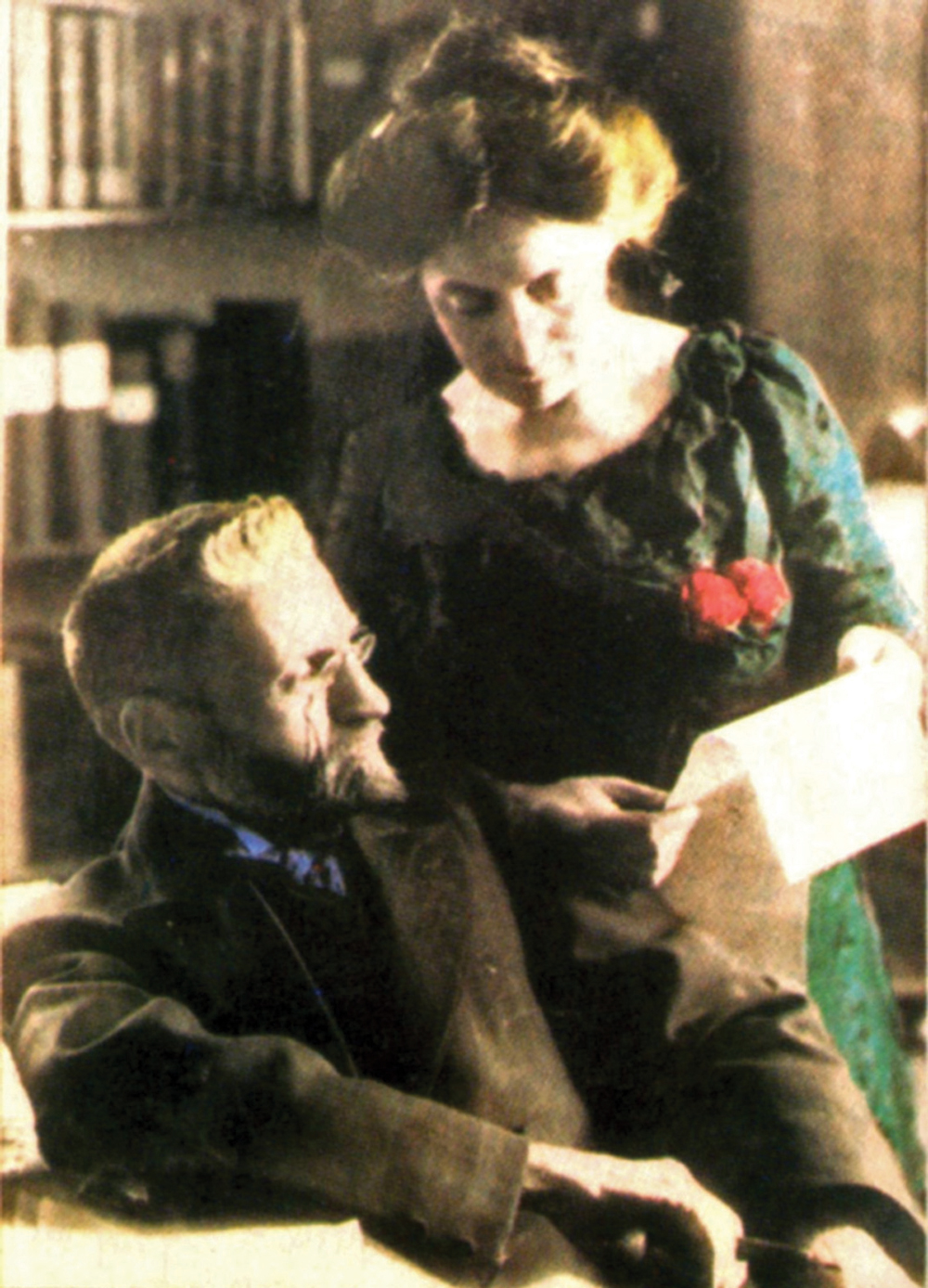Part 1: Father of the Modern Hebrew Language
Part 2: Eliezer Ben Yehuda: The Visionary
Part 3: The World’s Very First “Hebrew Child”
Part 4: Jerusalem’s Orthodox Jews vs. Eliezer Ben Yehuda
Part 5: Ben Yehuda’s New Virtuous Wife / Eliezer Ben Yehuda Meets Theodore Herzl
Part 6: Eliezer Ben Yehuda’s Destiny: Two Steps Forward, One Step Back
Part 7: The Secret to His Success
FATHER OF THE MODERN HEBREW LANGUAGEPART 1
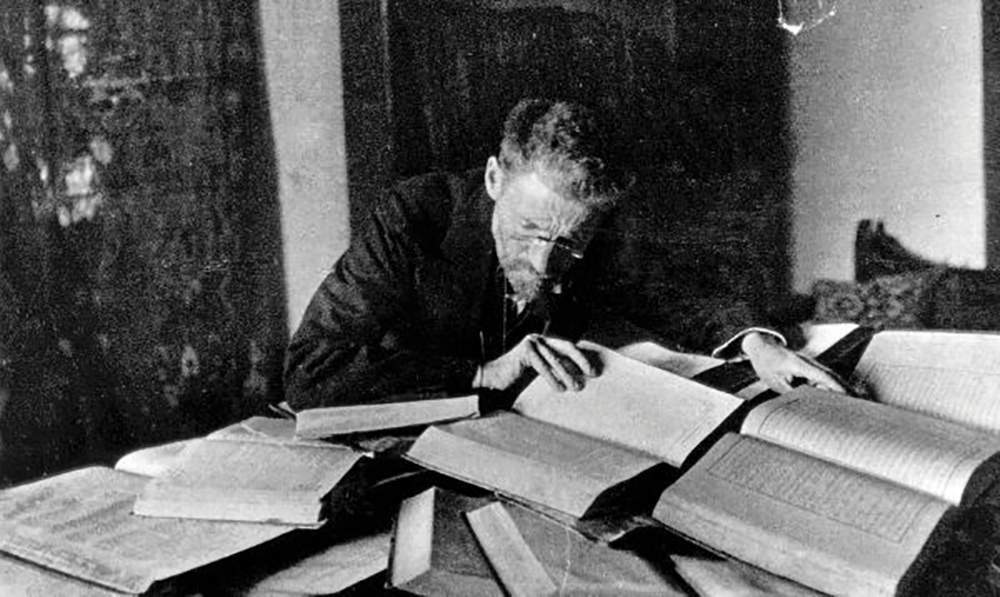
Eliezer Ben Yehuda 1858-1922
I had the great privilege of knowing Ehud Ben Yehuda as a dear friend when I lived in Jerusalem in the early 1970’s. I also knew his younger sister, Dola. Both were in their 70’s. They were two of the three living children of Eliezer and his second wife Hemda. The story of their father’s work and mission in life against unthinkable odds is both heartbreaking and heartwarming. There are many books about his accomplishments. My purpose is to describe the struggle this family underwent to raise the Hebrew language from the dead. Their story is a huge life lesson for those called to accomplish something extraordinary. I will present this incredible story in a series over the next few months.
What kind of person does it take to single-handedly resurrect a language which had been dead since the second century A.D.?
It is true that in the 19th century there were a great many Jews who knew how to read the Torah and rabbinical books in Hebrew, or at least mouth the letters in the prayer book—especially in Eastern Europe. The ancient texts were chanted by religious Jews, but for the most part, barely understood. In Jerusalem there were a few Sephardic Jews (from Arab countries) who could even speak some Hebrew, but with a limited ancient vocabulary lacking all modern concepts. No one even considered that Hebrew could be a living language. Not one Jew spoke it as his mother tongue. For all practical purposes, the language was dead.
In the 1880’s there was a babble of many foreign tongues spoken by a grand total of some 30,000 Jews who had come to the Holy Land from the four corners of the earth. Simply put, without Eliezer it is doubtful there would have ever been a revival, literally, a resurrection of spoken Hebrew. Therefore, Eliezer Ben Yehuda bears the title of “The Father of Modern Hebrew” throughout the Jewish world.
Born in Lithuania in 1858, Ben Yehuda, the youngest in his family, learned the Hebrew Scriptures on his father’s knee. He loved spending time with his father, and with a phenomenal mind, at the age of four he already knew significant portions of the Torah, the Talmud, and commentaries by heart.
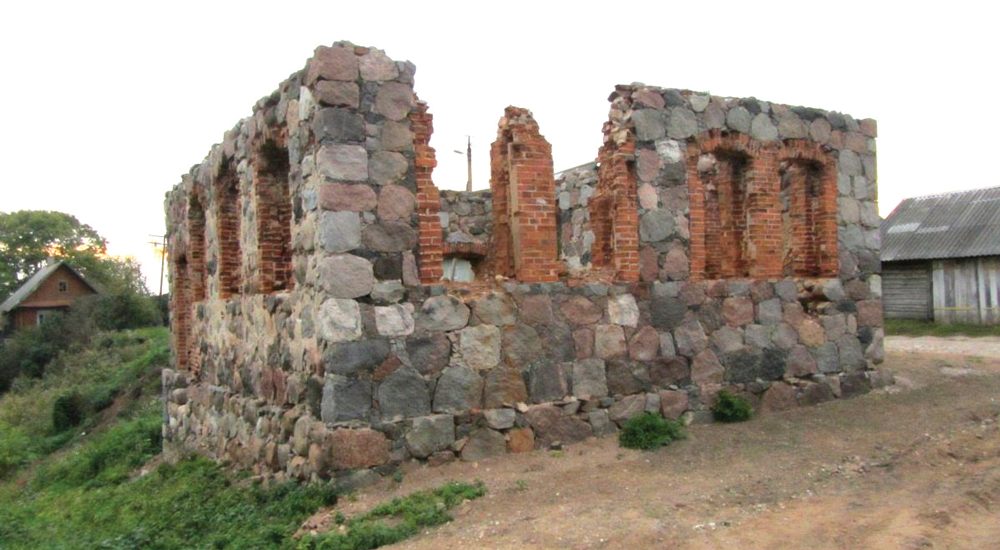
Ruins of a typical house in Luzhky, Lithuania, Eliezer Ben Yehuda’s birthplace.
But his father had tuberculosis and one day as he was studying the Torah with his four-year-old, he suddenly coughed up a huge amount of blood which covered the Torah page. His last words were, “Eliezer, my son, clean the Torah! Don’t bring dishonor to our sacred book.”
From that time on, the young child was sent to one religious boarding institution after another. He was always the best student wherever he studied. At one academy, his favorite Rabbi slipped him a rare book that was not religious, but translated into Hebrew—“Robinson Crusoe.” It was that book that ignited his belief that Hebrew could be a living language once again.
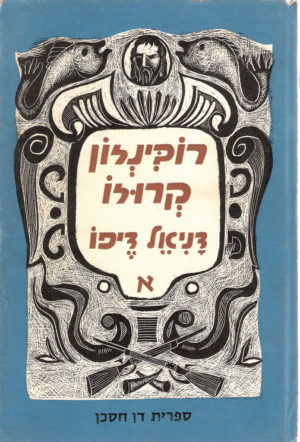
Robinson Crusoe, one of a tiny number of secular books translated into Hebrew in the 19th century – forbidden to religious Jews. (Picture is a modern translation)
In his memoirs he wrote,
“I fell in love with the Hebrew tongue as a living language. This love was a great and all-consuming fire that the torrent of life could not extinguish—and it was the love of Hebrew that saved me from the danger which awaited me on the next step of my new life.”
That next step came when he was slipped a short volume of Hebrew grammar by his favorite Rabbi who had dared to taste of non-religious books. Of course, his ultra-religious uncle with whom he lived was horrified that his nephew was straying into areas outside rabbinical literature, and in a rage, threw the 14-year-old boy out of his house, telling him never to return.
A CHANCE MEETING THAT WOULD CHANGE HISTORY
Devastated, Eliezer wandered through the night to a nearby town, went into the local synagogue, and fell asleep. A Jewish businessman, Solomon Jonas—more secular than traditional—approached him and invited him to his home. Eliezer was immediately drawn to his library, but found he could not understand a single word. The only alphabet he knew was Hebrew. Even his mother tongue Yiddish was written with the Hebrew alphabet.
Jonas took him in as a son. Recognizing his brilliant mind, the whole family participated in preparing him for an entrance examination to a state (secular) school, and after that, a university. Jonas’ daughter, Devora, was enlisted to teach him Russian and French—required for the state school. He taught himself mathematics and biology by reading books in his newfound languages. He excelled in school and made plans to attend university. Eliezer and Devora kept in touch by mail. For Devora, he was her prince.
He became very much a secularist, loving the great literary giants in Russian and French. No longer was he interested in Jewish things—except there was one thing he could not let go. He wrote, “That string was my love of the Hebrew language. Even after all things Jewish became foreign to me I could not keep away from the Hebrew tongue…”
A NEW MOVEMENT: “NATIONALISM”
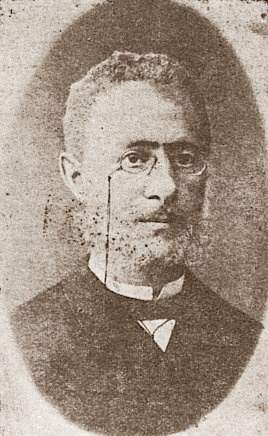
Solomon Jonas. Secular businessman, who by chance met the homeless Ben Yehuda and “adopted” him into his family.
Among the important events that lit a fire in this visionary was a rising “nationalist” movement among different peoples who wanted their own country. He saw how the Bulgarians were rebelling against their rulers, the Turkish Ottoman Empire, and he thought, if the Bulgarians who are not an ancient, classical people could demand and obtain a state of their own, then the Jews, the People of the Book and the heirs of historic Jerusalem, deserve the same.
In the middle of the night, as he was reading newspapers, he said, “Suddenly, as if lightning struck, an incandescent light radiated before my eyes…and I heard a strange inner voice calling to me: ‘The revival of Israel and its language on the land of the forefathers!’ This was the dream.”
He then read a unique and controversial book by the famous author George Eliot in 1876, calling for a homeland for the Jewish people. That was the deciding factor that crystalized his mission for life.
He would go to Paris to study medicine and become a doctor. With that career he would have a profession to earn a living for himself and his family. He planned to marry Devora, and they would go to live in Jerusalem.
HIS CATHOLIC CONFIDANT
Thus in 1878, Eliezer began his medical studies at the Sorbonne. He was penniless, but found an attic to rent and ate one meal a day. He spent his days studying in libraries across Paris. Visiting a Russian library he met a new friend, a Russian/Polish Catholic journalist, Tchatchnikof, who promptly adopted him, and opened for him the door to French literary society, introducing him to such literary giants as Victor Hugo.
It was a rare friendship because of the long history of anti-Jewish teachings by the church and state-approved anti-Semitism throughout Europe. Jews associated with Jews. But Tchatchnikof became a bosom friend, coaching him in the art of journalism and also giving Eliezer occasional work to help him support himself. Most interesting, Tchatchnikof began pushing the visionary towards acting on his dream of a Jewish homeland.
The journalist asked his friend, “Are there any other Jews who long to see their national life reborn?” Eliezer’s answer was, “All Jews believe they will return to their land when the Messiah comes.” But, he added, the educated “enlightened” Jews [who might have the means to do something] tend to assimilate, out of the fold.
The Pole then asked if anyone had ever published the idea of Zion returning to its land. Eliezer explained there was a Hebrew periodical called “Hamagid.”
“So, can you write in Hebrew?” When Eliezer admitted he was not sure how good he would be, the Catholic journalist countered, “If you can express yourself in Hebrew, you can write the article. Maybe that is why we have been brought together at this time, in this city which is the center of liberal nationalism.”
When Eliezer suggested someone else could do it, Tchatchnikof burst out, “This is childish foolishness! Whoever has the first inspiration must be the one to state the case and get it published. Go to it, and let’s have no more argument about it.”
Eliezer wrote the article and sent it to “Hamagid,” which turned it down. Despondent and also realizing his health was deteriorating, he felt that a little light had been lit, and then extinguished. He fell into depression, seeing himself as just another Parisian who succumbed to poverty and ill health.
HIS FRIEND: DON’T GIVE UP!
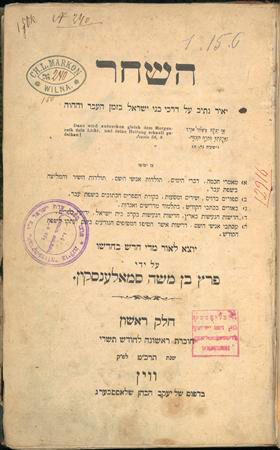
“HaShahar” (“The Dawn”), a Hebrew newspaper which printed Eliezer Ben Yehuda’s first article calling for a land and a language for the Jewish people.
But Tchatchnikof became angry. “You show none of the hope and resilience that are the hallmarks of the Jews. You cannot give in, and you dare not lose hope. There must be another publication in Hebrew somewhere to which you can send your article,” he said. And there was. Eliezer sent his manuscript to “The Dawn,” a Hebrew periodical in Vienna, and his article was accepted for publication.
A few weeks later, Tchatchnikof came to visit his friend and found he had been spitting up blood. He had contracted tuberculosis, very possibly years before from his father.
Eliezer told his journalist friend, “Too bad! I have just received a letter from ‘The Dawn’ publisher who stated, ‘I was very pleased with your article, and I am sure that you are destined for great achievements.’” “But,” said Eliezer, “it is too late. I am spitting up blood—a sure sign of tuberculosis.”
Instead of sympathy, Tchatchnikof went into a rage. “Did you go to a doctor? Are you sure it is tuberculosis—and do you know for a fact that it is fatal?” The Polish journalist took him to his own doctor who sent him to a specialist. The diagnosis was that Eliezer had six months to live.
“Well, that’s that—I will die in six months” Again, Tchatchnikof was furious. “You must not die,” he declared. “Too many liberation movements were stillborn because their creator failed to insure his own survival.”
He reminded Eliezer of the great Jewish philanthropist, Baron Edmond Rothschild, who helped Jews in need. Eliezer was hesitant to ask for help, but the journalist himself petitioned Rothschild, who sent the sick man to his hospital in the warm city of Algiers. He recovered his strength and began writing more articles.
Tchatchnikof came to visit him in Algiers, and Eliezer read him his third article. Here are a few lines:
Let us therefore, revive the language and plant it in the mouths of our youths and they will never betray it—but we shall not be able to revive the Hebrew language except in the land where the Hebrews form a majority of the inhabitants. Let us therefore, increase the number of Jews in our desolate land; let us return the remnant of our people to the land of their forefathers; let us bring back to life the nation—and the language will live, too!
If we revive the nation and return it to its land—the Hebrew shall live, too! For in the end, this is the only path to final redemption—and without that redemption we are lost, lost forever.
Tchatchnikof exclaimed: “Eliezer, what a shame you are not a Polish Catholic! You could become the youngest saint of our people…I hope your people will realize what words of prophecy you are uttering. In your voice I hear Jeremiah and Amos, Isaiah and Ezekiel. I have never felt one way or another about the Jews—but now I know that the seed of the prophets is still alive. Your people shall know the redemption you talk of—and you shall be known as a prophet of that redemption.”
Eliezer won another influential ally—Peretz Smolenskin, the author and publisher of “The Dawn.” After reading the logic and the passion in Ben Yehuda’s articles and then watching in horror the terrible pogroms in Russia, he realized the only answer was a land and a language that belonged to the Jewish people.
Back in Paris, Eliezer prepared to leave for Jerusalem. “It would be the height of hypocrisy for me to call my people to return to their desolate land while I myself stay in Paris.” Tchatchnikof encouraged him and even gave him money to make the trip to the Holy Land.
Sadly, Eliezer knew he must terminate his relationship with Devora Jonas, the love of his life. As a man with tuberculosis, he might die at any time, or worse, pass the disease onto a wife. Anyway, he would not be able to support a wife and family.
He wrote a letter to Solomon Jonas, the father of Devora, and explained that though for years he had planned to marry Devora, he now released her because of his sickness. He also explained that he was leaving to live in Jerusalem. He wrote, “I do not know what I shall do when I get to the Holy Land—I only know that I must go there.”
He continued,
“I have no choice but to terminate my promise to your daughter. Please believe me, sir; I am not doing this out of baseness. I have not fallen out of love with her. She is still very much in my heart—but I can no longer offer her anything! I cannot promise her a home and a family. Nor can I offer her a long marriage. Indeed, if she marries me, my doctors inform me, she may fall victim to this cursed illness of mine. Please sir, in your kindness, act as my messenger and convince your dear daughter that she must forget me and find another, more worthy man to love and marry. I shall pray that she is happy. Believe me, sir; she is better off without me.”
FATHER OF THE MODERN HEBREW LANGUAGE: PART 2THE VISIONARY
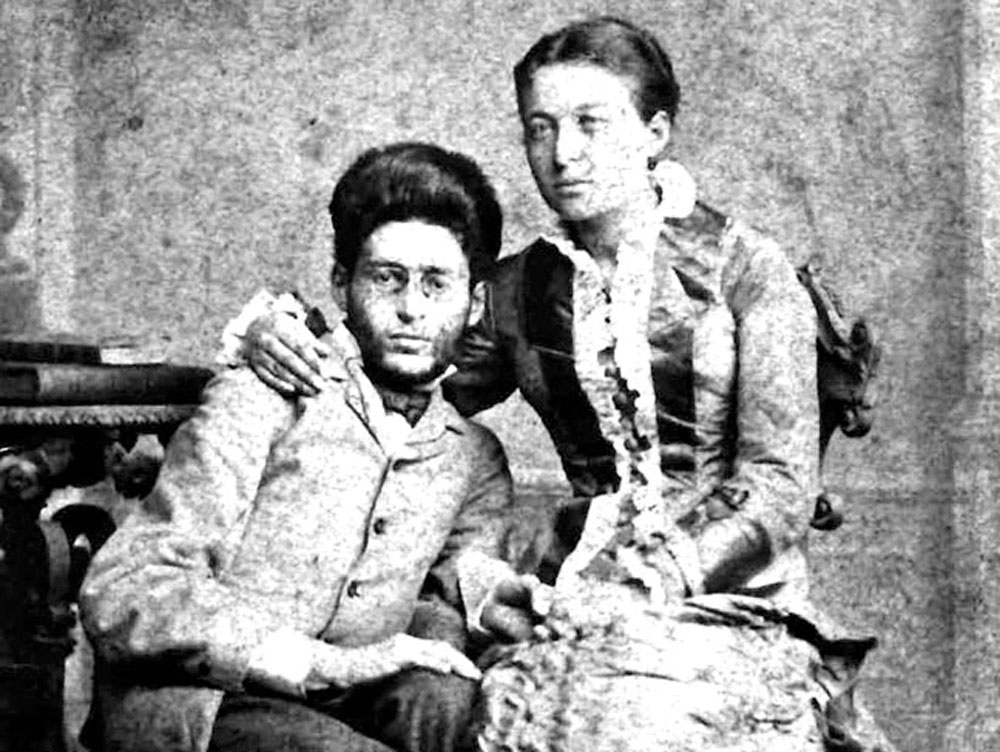
Ben Yehuda and his wife Devora in 1882, soon after their arrival in Jerusalem.
When Eliezer Ben Yehuda decided to leave Europe for Jerusalem in 1881, there was not a single person in the Holy Land, or any place else in the world, who spoke Hebrew as their mother tongue. There was no such thing as everyday, spoken Hebrew—only words to be read from the Bible and rabbinical passages.
But Eliezer fell in love with the Hebrew language. Moreover, he saw it as the tool to recreate a united Jewish people who would return to their ancient homeland. Even stranger, he seems to have been the only human being in the world who grasped the connection between the language and the land.
He had plans to marry Devora Yonas, daughter of a well-to-do family, now in Russia, who had unofficially adopted him when he was a 14-year-old orphan. But then to his great dismay, at age 23, his dreams shattered when he was diagnosed with tuberculosis. He wrote Devora’s father, Solomon, telling him that he could no longer marry his daughter because the doctor said he might only have six months to live. He decided he must live in Jerusalem and finish out his days there.
To say the least, Solomon, Devora’s father, was relieved to receive Eliezer’s letter. They all loved Eliezer as part of their family, but there was no way their daughter could marry a sick man on his way to a desolate far-off land.
But when Solomon broke the news to Devora, she would not hear of it. She told her parents that she was going to marry Eliezer! She had waited for seven years to marry him and nothing was going to stop her now. Her mother, Rivka, was beside herself. How could she let her daughter go to that God-forsaken land with a dying man?
SHE LEFT WITHOUT A PASSPORT
Amazingly, her father finally acquiesced. He saw the love she had for her man, and he decided to let her go. This was indeed a remarkable family. They arranged for her to meet Eliezer who would be in Vienna a week before he left for Jerusalem, and in two days she was smuggled out of Russia without a passport.
Eliezer was delirious with joy. He wrote in his diary:
“Not my sickness, nor a life of sorrow which seem to be my lot, deterred her from her desire to share my life. Our lives had become one, and the first Hebrew family in modern times had come into being.”
When they met in Vienna, he told her about the change in direction his life had taken under the influence of Tchatchnikof, his Catholic mentor who had turned the young idealist into a political activist. Now, convinced of the truth of his vision, he was ready to write and publish his ideas—all in the Hebrew language which he was still then learning.
SPEAK ONLY HEBREW!
He told his wife-to-be, “Devora, you are going to be the first Hebrew mother in nearly two thousand years. Our child will be the first infant in all these centuries who will come into the world hearing nothing but the beauty of our ancient language!”
And then came reality. He told her there were certain conditions to the success of his life’s mission. His words to Devora went something like this:
“I must ask you, dear Devora, that from now on you shall speak only Hebrew. We must set an example for our people, for those who would come after us. Hebrew must live again! It must become more than just a language of literary exercise! We must run our home in Hebrew, bring up our children in Hebrew, make love in Hebrew—and if we fight and argue, even that we must do in Hebrew.”
She answered, “But I really don’t know any Hebrew, dear!” He insisted, “Until you do—keep quiet in Hebrew.” On the spot, while still in Europe, he began teaching her words in Hebrew. This is a “tree,” a “window,” a “street,” a “lantern.”
ON THEIR WAY TO JERUSALEM
In the fall of 1881, the new couple, accompanied by Eliezer’s Polish friend, Tchatchnikof, stopped in Egypt, and found a Rabbi to marry them.
They arrived in Jerusalem, a city of 25,000, of which more than half were Jewish. They were overwhelmed by the utter squalor and wretchedness of the city. Open sewers and a stench everywhere. And they were practically penniless. But Devora was as unique a person, as was her husband.
The zeal of the prophets became her zeal, too. She was Eliezer’s wife now, and soon she would fulfill her love’s desire. She would become the first Hebrew mother in modern times. She would have many children, and they would be the first children in nearly two millennia to speak Hebrew from birth!
ANOTHER MIRACULOUS MEETING
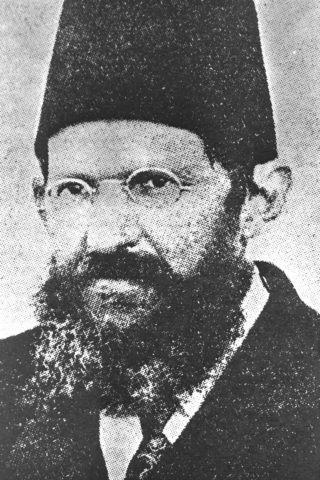
Dov Frumkin, editor of “Havatzelet” (The Lily) in Jerusalem who offered a job to Ben Yehuda.
Because several of his Hebrew articles written in Europe had been published in a Jerusalem journal, the publisher, Dov Frumkin and his family, were awaiting the arrival of Eliezer and his wife. In one of those “chance” happenings, Frumkin told Eliezer he was leaving for six months to sell subscriptions to his newspaper in Russia and offered him a job on the spot as assistant editor. He would have a salary equivalent to $5.00 a month.
In one stroke of fortune, Eliezer believed he could provide a livelihood for himself and his wife, and launch a journalistic career. “The trumpet,” he said, “was put to his lips to sound the blast of liberation.” He announced, “I have called for a war to recapture Israel’s land and language.” This would be his life’s work.
He immediately perceived that the greatest blockage to his goals was the extreme alienation among the tiny groups of religious Jews in Jerusalem. He decided he would take it upon himself to bring them together in unity so that these great goals could be achieved. He would become religious himself!
ELIEZER AND DEVORA BECOME ORTHODOX
While privately admitting that many of the Jewish traditions were old-fashioned, and others had nothing to do with the Torah or Judaism, he and Devora both took on the yoke of the Torah, keeping a kosher home, the Sabbath and the Holidays, going to synagogue and observing the traditions of Judaism. He grew ear locks and a long beard. He prayed every morning with his prayer shawl and phylacteries. He thought religious discipline would be a binding agent for Jews everywhere. Anything to bring the Jews of Jerusalem together!
But alas! The Orthodox saw Ben Yehuda as a pagan and an enemy of the Jewish people because he was defiling the holy language of the Bible and using it in everyday language. They could not imagine using this language to say, “Take out the garbage!” And they became Eliezer’s fierce and violent enemies throughout his life.
The Ben Yehuda family moved into their first rented house. It faced the “Wailing Wall,” but they had to cross through seven dirty courtyards ankle-deep in debris to reach it. And to reach their rooms it was necessary to climb a rope ladder.
ALONE IN JERUSALEM
Even more depressing, he and Devora had few friends in Jerusalem. There was a couple heading a Jewish charity from England, Michael Pines and his wife, who befriended Eliezer and Devora. Because of a religious (but not extreme) upbringing, they knew enough Hebrew to communicate. The four made a pact to only speak Hebrew to each other. For Ben Yehuda, ever the visionary, “that evening was the beginning of the revival of Hebrew as a common spoken tongue in the Land of the Fathers!”
He should have known, however. His Hassidic employer, Dov Frumkin, hated the Pines because they were part of the anti-Hassidic stream. And for Devora, because she was absolutely forbidden to speak in any other language, she found herself alone most of the time. Instead, she spent time practicing words and sentences that Eliezer wrote down for her. She would wait for him to come home after work at night for another Hebrew lesson.
The community of 16,000 Jews in Jerusalem was a “generation of separation.” Each little group spoke in the tongue of the land from which it came, isolated from one another. Their various Ashkenazi Rabbis (from Europe) had the utmost disdain for the Sephardic Jews (from Islamic lands). And each little community spoke their own language.
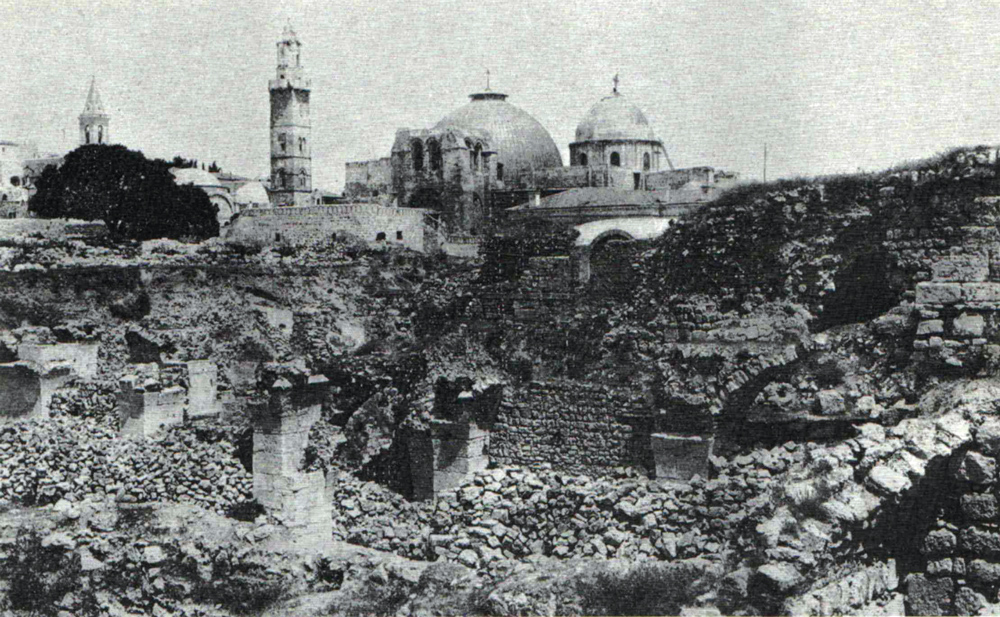
The old city of Jerusalem in 1890.
ROTHSCHILD INSISTS ON FRENCH IN HIS SCHOOLS
Baron Edmond Rothschild was the greatest philanthropist of Israel’s pre-state days. Through his charity, Alliance Israelite Universelle, he purchased property for settlers near the Jaffa area, gave farmers vineyards and wineries from French grapes, and built a school in every new settlement.
But for him, the national revival of Hebrew as the national tongue was a pipe dream! In fact, the whole idea of multitudes of Jews making aliyah to Israel was pure fantasy. Yes, he would help the poor in the Holy Land, but the French Baron demanded that French be taught as the main language in all his schools! He simply saw Hebrew as a dead language.
Eliezer wrote a stinging article, a call to war against Rothschild’s Alliance, in which he saw him as a dangerous enemy to the whole concept of a national revival in the land of Israel. Yes, the Alliance was practical. Rothschild wanted to prepare these students to be able to function anywhere in the world.
THE VISION
But Ben Yehuda’s vision was completely different: the resurrection of the land and the language of the Jewish people. Years later, he wrote,
It would seem that in the history of nations there are times when the realists cannot lead properly, and only the dreamers, those who do not take facts into account can cross the impregnable boundary of reality and create a better reality for the nation!
Ben Yehuda had a dream and a passion. That’s all he had.
FATHER OF THE MODERN HEBREW LANGUAGE: PART 3THE WORLD’S VERY FIRST “HEBREW CHILD”
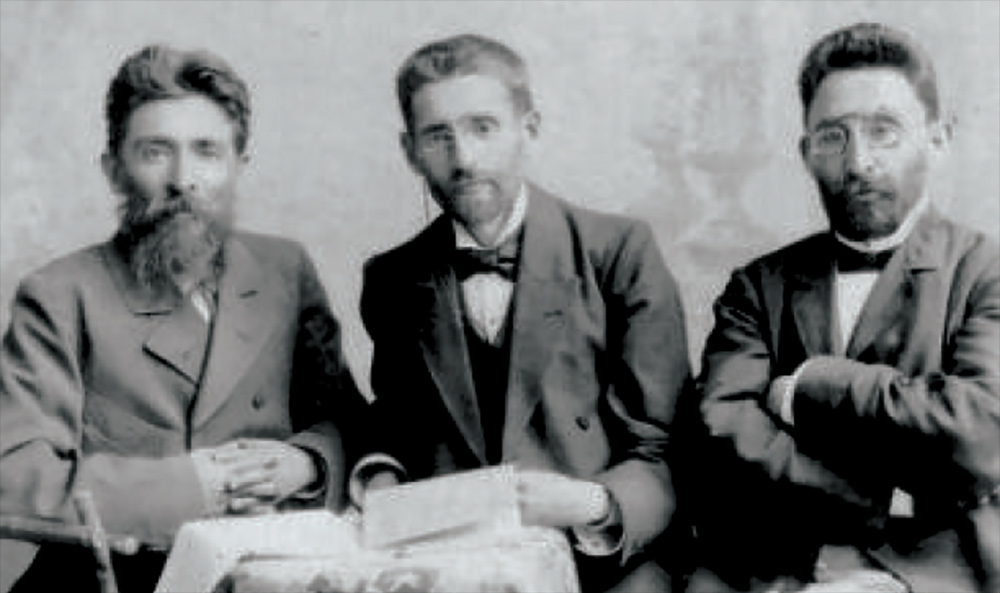
In the early 1880’s, the first of the first pioneers to the Holy Land were leaders of BILU. Left: Yaacov Shertock, whose son Moshe Sharett (who took a Hebrew last name) became second president of Israel; Right: Zeev Vladimir Dubnov. Center: Eliezer Ben Yehuda.
Eliezer Ben Yehuda was one of the most unusual human beings the Jewish people have ever birthed. He was a radical visionary, a dreamer of the nonexistent, a self-made genius lexicographer (compiler of a dictionary), plus an extraordinary organizer and influencer of people to attempt the impossible. All of this describes a very sick man who worked 19 hours a day for some 40 years. It was this man whom the God of Israel singularly used to resurrect a dead language and play a critical part in gathering the dry bones of a people scattered across the world.
Given some six months to live with tuberculosis, he and Devora, his bride-to-be, left Europe for the Holy Land in 1881. Jerusalem was his destination where he planned to fulfill his mission as long as he had breath. With the vision of a prophet, he understood that Hebrew would never become a national language unless there was a Jewish nation. But he equally understood that the Jewish people would never become a nation without a national language.
An equally amazing person was Devora, who gave her life to fulfill her husband’s vision. She arrived in her new country with a few Hebrew words she had learned on their voyage to the land of Israel. The great mission she accepted and partnered with her husband was to create the first Hebrew-speaking family in the world.
Eliezer dreamed of a family—his family—having many children, all speaking Hebrew from birth. And so Devora became pregnant only a few months after their arrival in Jerusalem. Her first task was to learn Hebrew herself, as she had covenanted with Eliezer that she would from then on speak only Hebrew with him, her friends and their children yet to be born. Not a single word of any other language was to be permitted.
STUDYING HEBREW WITHOUT BOOKS
Now came reality. Devora studied many hours a day learning Hebrew—by herself. With no textbooks. With no other friends with whom to speak Hebrew. Not even a husband to teach her the language, except at night when he came home exhausted from his work as substitute editor of Mr. Dov Frumkin’s little newspaper, The Lily.
The greatest challenge of all was their abject poverty. Often they struggled to buy enough flour to bake a loaf of bread—many times this was their entire meal.
About three months after their arrival, a visitor knocked at their door. His name was Nissim Bekhar. He was principal of a boys’ French school run by the Alliance Israelite Universal, through the generosity of the wealthy Baron Edmond Rothschild. In complete contradiction to Rothschild’s orders that his schools in the Holy Land not teach Hebrew, Nissim asked Eliezer to teach Hebrew in his school! He explained he was in agreement with Eliezer’s vision of a national revival, and understood the relationship between the people, the land and the language.
Bekhar told Eliezer he had been given no budget for such a position, but he was ready to take a bit off the salaries of two teachers of religion, and give them to Eliezer. Again, the visionary was working for a pittance, but his intense passion to teach young students “Hebrew in Hebrew” far outweighed his desire for money. “Hebrew in Hebrew” was Eliezer’s unique way of teaching. From the first day of each new Hebrew class, he would speak only Hebrew to his students. His classes were extremely successful and some of his very first students became leaders in the formation of the future new nation.
ULTRA ORTHODOX JEWS PRONOUNCE BAN
But Eliezer had more immediate challenges. His Orthodox neighbors’ hatred for this “heretic” continued to intensify. They regarded Eliezer’s drive to popularize Hebrew and even teach children to speak Hebrew as an attack on the Jewish religion, their way of life. When he attended synagogue, no one came near him. In their minds, these Ashkenazi Jews linked nationhood with the coming of the Messiah. They declared a religious ban on the Alliance school, and on anyone who would dare enter its doors.
Meanwhile, Devora continued her daily struggle to learn Hebrew for her soon-to-be-born baby. Her loneliness was constant. A few women would have liked to befriend her but they didn’t speak Hebrew. Eliezer was adamant that she would speak no other language. She struggled on. Perhaps the most difficult part was that the man she so deeply loved was so despised by the citizens of Jerusalem.
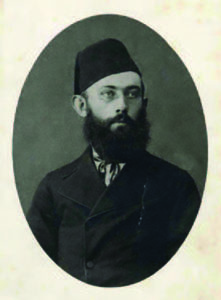
David Salman Levontin succeeded in purchasing 835 acres of land near Jaffa from the Turks in 1882. On this acreage was built the very first Jewish settlement in the Holy Land—Rishon Le’Zion.
THE VERY FIRST PIONEER GROUP
Nevertheless, as persecution of Jews in Russia intensified, Eliezer’s articles written in the little Hebrew newspaper caught fire. Word spread, and on the eve of Passover 1882, some 15 strapping young pioneers— including one girl—had just arrived amid horrific persecution from Russia and surrounding countries. Walking down the street they were shouting Ben Yehuda’s name as they searched for his house.
They had read Eliezer’s articles in “the newspaper from Jerusalem” asking them to return to their fatherland, and so they came! They called themselves BILU—the acrostics for “The House of Jacob; Go and we will follow!” Well-educated college kids, they decided to follow the vision. They pleaded, “Eliezer, we are willing to do anything and everything— please lead us, please tell us what to do!” Several of these young people were already speaking some Hebrew learned in Russia.
Although Eliezer had only moved to Jerusalem a year earlier, he helped them get settled in different areas of the country and sent some to study farming at an agriculture school. They were really the first of the first, and they gave great comfort and excitement to Ben Yehuda. Today, every Israeli school child knows about BILU.
TURKS BLOCK FURTHER JEWISH IMMIGRATION
Immediately, more and more young Jews began to land in the port city of Jaffa. As Eliezer had foreseen, the Arabs began to complain. Within weeks, the Turks made a decree that no Jews would be allowed to immigrate to Palestine. In fact, they declared it on the ninth day of Av, the same fateful historical day both Jewish Temples were destroyed by Israel’s enemies.
The Jewish majority in the Holy Land began to decrease as Arabs from the surrounding areas freely swarmed into the land to find work wherever the Jewish immigrants were settling and building infrastructure.
Still, Jews were being smuggled into the Holy Land—mainly with bribes. A Jewish entrepreneur, David Zalman Levontin, actually succeeded in buying 835 acres of land 10 miles from Jaffa. His group invited the BILU young people to join them. Together they established the very first settlement in the land of Israel. They set up tents and called it Rishon Le’Zion—“The First to Zion.”
The group then rushed up to Jerusalem by horseback to announce the great news to Eliezer Ben Yehuda—to celebrate this great event. On that very night, another “first” became reality. Devora gave birth to the “first Hebrew child” in 1900 years, and they called him Ben Zion, “son of Zion.” To Eliezer—the visionary—he saw these two events as enormous signs that God’s favor was upon the land.
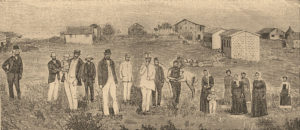
An illustration representing Rishon Le’Zion sometime between 1906-1913. Begun in 1882, this settlement almost collapsed because of poor farming results and very scarce water sources. The Jewish philanthropist, Baron James Rothschild came to the rescue by providing farming techniques and water wells.
WAITING FOR BEN ZION TO SPEAK HEBREW
Time went on, and the “first Hebrew child” grew into a fine, healthy little boy. He was carefully guarded so he would never hear one single word in any other language but Hebrew—mostly from his mother and father. He was alert and vivacious, a gregarious three-year-old, happy to see and be handled by his parents’ many close friends who had accepted the edict of speaking only Hebrew words to him.
There was only one small cloud over this little boy. He was three years old and he had not yet uttered a single word. Devora knew on her side of the family, all the children had begun to speak before they reached their first birthday.
She wondered if Eliezer was a late talker. Or if there had been a mute in his family. She was concerned because their friends began blaming her and Eliezer for his lack of speech. They reminded Eliezer that Hebrew was a dead language. One of his closest friends, Michael Pines, pleaded with Eliezer to teach Ben Zion a living language like Russian. Then, Pines said, he could always learn Hebrew as he grew older. Pines explained to Eliezer that learning Hebrew was good for adults, and even school children—“as you have shown in your classes at Alliance. But not for babies!”
FRIENDS FEAR FOR CHILD’S MENTAL CAPACITY
Pines agreed that Ben Yehuda’s vision of a Hebrew-speaking nation was good. And he told how he and more and more Jews in the Holy Land were actually learning to speak Hebrew. But somehow, the citizens of Jerusalem had concluded that the little boy needed a chance to learn a known language, or he might end up an idiot!
In fact, the boy was almost four—and completely mute. But Eliezer shouted to his friend, “Then let him be an idiot!” Later he spoke to Devora, “Don’t you see? It is a great and noble experiment that we are undertaking with our child. I firmly believe that we shall succeed.
“But if I do not, I promise you that I shall not be ashamed to declare my failure in public—to announce that Hebrew is a dead tongue, unfit for children to be weaned on.
“However, I am still quite convinced that our child will be no less capable of speech and reason, no less smart than all other children born in Jerusalem or Moscow, for that matter. Soon, very soon, he will begin to speak, and his words will be a balm for us—like the words of the prophets of old!
“And you, Devora, will be the heroine, the first Hebrew mother since the destruction of Jerusalem at the hands of Titus!”
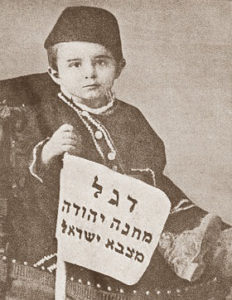
Ben Zion, born July 31, 1882, “first Hebrew child.” He later changed his name to Itamar Ben-Avi.
ELIEZER CATCHES WIFE SINGING IN RUSSIAN
Not long after, he was returning from a trip to Rishon Le’Zion, to meet with some of his followers and sell a few more subscriptions to his newspaper. Mrs. Pines had just visited Devora and made the remark about, “children who are made a sacrifice for the sins of their parents.” Pierced through her soul, she held her child crying. She thought back to her own childhood in Russia, and without thinking, began singing a lullaby to her child in Russian, tears running down her face.
As fate would have it, just at that moment, Eliezer entered the house and found his wife singing this Russian song to Ben Zion. Furious, he began shouting at her. Devora, confused and not able to answer, had not really been aware she was singing in Russian. She cried in silence, and Ben Zion, wanting to come to his mother’s help, shouted, “Abba, Abba, lo!” (Father, father, no!)
Both parents were stunned—and then broke out in shouts of joy! Their son was speaking! And his first words were in Hebrew! Despite the rabbinical ban on speaking to the family, crowds of people from all over Jerusalem came to see the “miracle child”—the first child in the entire world to speak Hebrew as his only language!
SOME HEBREW WORDS CREATED BY BEN ZION
From that time on, he wouldn’t keep quiet. Full of questions, he would ask, “What is this? What is that?” Eliezer was pushed to come up with new words that did not yet exist in Hebrew. Ben Zion, instinctively understanding the language’s logic, soon began making up his own words. In fact, as soon as his brother and three sisters were born, one after another, Ben Zion became their teacher, often coining words that his father was more than happy to add to his list of new words that were published in his weekly newspaper columns.
The children’s successes were great examples to the pioneers of the new settlements who were teaching their own children Hebrew with many challenges, because they lacked so many practical words.
FIRST HEBREW DOG BECOMES MARTYR
One day Ben Zion found a stray dog, and told his father that it was a “Hebrew dog.” He pled with his father that he really needed this dog because then he would have someone besides his mother and father to talk to. One day the five-year-old and his dog were sent to the post office to mail a letter.
He lost his way and ran into a group of ultra-Orthodox kids. He started to run and yelled for his dog saying, “Mahir! Bo!” (Quick! Come!) The religious kids thought he was calling his dog “Meir,” the name of their Rabbi. They killed the dog and beat Ben Zion unconscious. The first Hebrew dog became a martyr of Israel’s rebirth.
Now, the second boy was born to the household. Eliezer had to borrow the money for the circumcision. Eliezer was finally satisfied that Hebrew would always be Ben Zion’s mother tongue, so he allowed him to attend Rothschild’s school with other kids, learning also French and Turkish. That is, until he heard his son singing patriotic songs in French! Ben Yehuda switched to home schooling on the spot.
JUMPING THROUGH THE TURKISH HOOPS
Even though Eliezer had been associate editor of the small news bulletin The Lily for his first year, he longed to be editor of a daily paper of his own, “as attractive in appearance as LeFigaro, the Paris Daily!” Obviously, that would take some time. But he was raring to go!
His first obstacle was the Turks with their stodgy bureaucracy. Under no circumstances would they grant Ben Yehuda a license to start his own Hebrew-language newspaper. Then through good fortune, Eliezer met a Sephardic Rabbi who happened to have applied for a license some time before, but was not using it.
This Rabbi was happy to rent it to Eliezer for the equivalent of $2.50—and the journalistic entrepreneur found another friend who would loan him that sum! It was Eliezer’s door to starting a real newspaper in Jerusalem. Over the years, it became the most important tool of communication for the new settlers of Israel—and it was all in Hebrew.
But with Ben Yehuda as the sole owner and editor of his paper, he became poorer than ever. Dirt poor. Even though he had a growing family, his newspaper was always fed first. He just didn’t have enough subscriptions to make any profit. But the paper was part of his dream to bring Hebrew back to life among the Jewish people. Furthermore, it generated interest among persecuted Jews—especially in Russia—to immigrate to the Land of their Forefathers.
MUST FIND A SOLUTION
But without enough proper nourishment, Devora became weak and ill. She often found herself coughing and running a fever. In their sixth year, Devora began coughing up blood. She had contracted her husband’s tuberculosis. The doctors suggested she spend some time in the warmer climate of Rishon Le’Zion, which she did for three months. She improved, but then Eliezer, too, began to cough blood. In order to survive, Devora suggested that Ben Yehuda take a trip to Russia, to meet with those interested in immigrating to Israel, and to sell more subscriptions to his newspaper. Fortunately, his (still) good friend, Mr. Pines, took on the job of editing the newspaper while Ben Yehuda traveled. But before he left, Eliezer said, “Devora, you must promise me by all that is holy you will continue with my ban on the children hearing anything but Hebrew while I am gone.” Devora promised.
FATHER OF THE MODERN HEBREW LANGUAGE: PART 4 JERUSALEM’S ORTHODOX JEWS VS. ELIEZER BEN YEHUDA
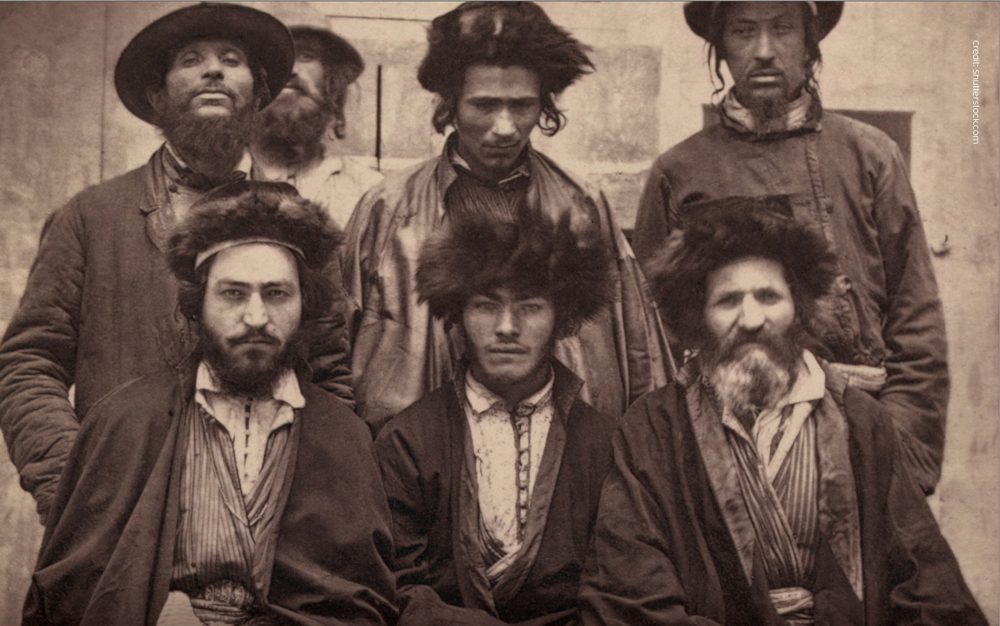
Picture of seven ultra-Orthodox Ashkenazi (European descent) men in Jerusalem, taken in 1876. Since Eliezer Ben Yehuda and his bride Devora arrived to live in Jerusalem in 1881, these men were most probably among those mobs of religious Jews who fought Ben Yehuda as he worked to revive the ancient Hebrew language for a future modern Israeli nation.
Down through the ages the Hebrew Bible has been preserved in its original beautiful lyrical language.
But as far as a 19th-century Jew trying to speak that same language of the prophets in a modern setting, it was a clumsy and awkward struggle. The Hebrew Bible has a total of 6259 unique words. (To give some perspective, the English language today has over 170,000 words in current use; Hebrew, about 80,000.) That’s why no one tried to speak Hebrew as an everyday language. No one, that is, but Eliezer Ben Yehuda. Not only were he and his family speaking in “everyday Hebrew” at home, he was teaching Hebrew at a Jewish school in Jerusalem. It took no time at all for him to understand that thousands more new words were needed for a modern language version.
Despite his abject poverty, Ben Yehuda’s personal example and his passion and skill in teaching had already made a great impression on others, many of whom themselves became teachers.
Though young Jewish pioneers had struggled mightily to start learning to read, write and speak Hebrew, not a single Hebrew dictionary existed anywhere in the world. In the 1880’s, you still needed new words like post office, ice cream, jelly, omelet, towel, bicycle, camera, light bulb, jump rope and dolly.
With so few people pioneering the language, it was crucial they would all be on the same page—literally. The new words being added to the modern Hebrew language must all come from the same source. Ben Yehuda understood there was no one else of his generation who could tackle such a project. But even he didn’t envision a Hebrew dictionary would take 50 years.
And so he began by writing on little pieces of paper every new word he found in some ancient document, or from the mouth of his “first Hebrew child” Ben Zion, or simply from his own creative mind. He was determined that each word would have its root based on a Biblical source and he wanted no foreign words in his dictionary. Soon he had boxes of bits of paper—each with a word as priceless to Eliezer as gold. But there was no food on the table.
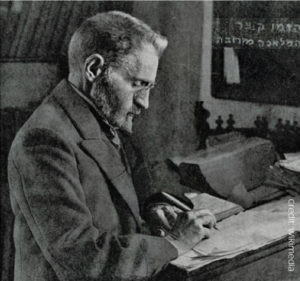
Eliezer Ben Yehuda at work on his weekly Hebrew language newspaper The Deer.
LOOKING FOR FINANCIAL HELP IN RUSSIA
At his wife’s encouragement, he left for Russia to the home of Devora’s parents who were well-to-do entrepreneurs. Since his main source of income was from subscriptions to his weekly newspaper, The Deer, he hoped to add subscribers at the meetings his father-in-law had arranged. Solomon Jonas was ready to help his rather unusual son-in-law, although he was surprised to see Eliezer now dressed in Turkish apparel as an Orthodox Jew who ate only kosher food!
There was no doubt that Ben Yehuda was an inspiring speaker. He began with his mantra: “The day is short, and the task is great!” This was a motto he had put in his office, purposely in front of his eyes.
His message to Russian Jews was both urgent and electrifying: “We, the Jews, have for too long, put all our faith in a miraculous national recovery, in the ‘coming of the Messiah.’ The people who continue to follow that expectation will be lost forever. God will not help any who will not help themselves. He created Adam to toil in His garden. We must learn from Adam. The time has come to help ourselves. We must act, and act now.”
He then went to Paris and was surprised to see how enthusiastically he was received. A shift had taken place. Instead of a dreamer, they were accepting him as a voice of a nationalist movement.
CHAOS WITH HIS NEWSPAPER
He headed home, not knowing his friend, Michael Pines, who had been substituting for Eliezer as editor of his newspaper, had written a supercontroversial pro-religious article about letting the land rest from crops for a whole year every seven years, as in Bible days. This article had the settlers up in arms.
Because the settlements of farmers were just trying to get the first crops out of the infertile soil that had lain barren for 2,000 years, Eliezer knew that letting the land lay barren again for a year would spell disaster for the new farmers.
He immediately wrote an article negating Pine’s article, telling the farmers to stay steady and keep farming through this initial step. At this time, Eliezer and his wife were both practicing ultra-Orthodox Jews, but he felt God would consider it more important for his people to stay alive than to observe the “Shmitah,” the seventh year of rest. And that was the end of his friendship with Pines, one of his very few good friends.
BLACK CANDLE CURSE FROM THE RELIGIOUS
For the Ashkenazi (European) Orthodox Jews, Eliezer’s article was the final straw. They called him a heretic of heretics, a great deceiver, and they proceeded to ban the building where his newspaper, The Deer, was printed. Again, they performed a ceremony of lighting black candles in their synagogue and a bill of excommunication was read. Rabbis spoke of the heresy of thinking that the land could be redeemed without the help of God.
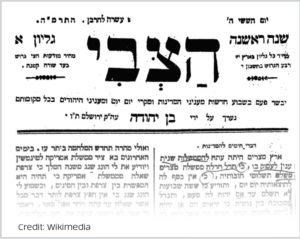
A snapshot of his newspaper with its headline The Deer.
Ben Yehuda’s response was instant. He told Devora, “The Orthodox have broken with me—and I am going to break with them. They will never accept us. We will always be outsiders.” For seven years he and his wife had kept every detail of the rabbinical law, believing their observance would help unify the Holy Land’s Jews. But at that moment, he took off the robe, removed his red fez, threw them on the floor, stomped on them, and cut off his beard. (He trimmed it to a goatee.)
Because the Sephardic Jews of Jerusalem (those who came from Arab countries) were not nearly as fanatical, he was still able to buy paper from them, use the same print shop and continue with his newspaper.
THE ORTHODOX SHOULD WORK
And with that newspaper, he tore into the Ashkenazi Jews. He blamed them for holding back the progress of Israel. He hit them where it hurt. He demanded that the large sums of donations the rabbis received be accounted for. He wanted the books opened to see how much the rabbis took for themselves, and how much their close friends were getting.
He recommended the rabbis buy land and give it to their yeshiva students to settle on, to build homes and establish small farms for their families—to work—instead of living off the dole.
The response of the Orthodox was yet another ban. Ben Yehuda’s home was now a no-go zone. No religious Jew could enter either his office or house on pain of severe punishment.
Those in the town of Jaffa and the settlements were completely on Ben Yehuda’s side. They knew if they didn’t plant that year, they would starve. But as far as personal friends from Jerusalem, only Nissim Behar, the Alliance school director, publicly came to his defense.
DEVORA TEACHES HEBREW UNTIL BANNED
Devora was now friendless, as all her acquaintances were afraid to defy the elders of Jerusalem. Then a unique opportunity was presented to Devora. Nissim Behar’s sister opened an Alliance school for girls under the patronage of Baron Edmond Rothschild. Devora was asked to teach Hebrew, which allowed Eliezer to give all his time to his newspaper and the dictionary. Even this reprieve, however, was short-lived, as the Orthodox threatened a ban on the Alliance school if Devora continued to teach there, so she was forced to leave.
The rage of the Orthodox didn’t stop there. Eliezer was warned by a young friendly Sephardic rabbi that there was a plot to kill him. But Eliezer refused to change his daily routine. The next day as he and his son Ben Zion entered the walls of the Old City riding a donkey, a mob of youths with sticks and rocks came at the two of them.
If it weren’t for some storekeepers, and then the police, they would have beaten them to death. Upon hearing of this, a “cavalry” of young settlers came up on horseback from the coastal plain to guard the Ben Yehudas—which temporarily put an end to the murderous attempts.
AN AMAZING FINANCIAL BREAKTHROUGH
Nissim Behar finally wrote Baron Rothschild, describing the incessant and endless persecution against Ben Yehuda and his family. And wonder of wonders! Who should come to his rescue but Rothschild himself! Though Rothschild did not believe Hebrew would ever become a widely-spoken language again, he admired Ben Yehuda’s work.
In a letter he wrote: “Have no fear, Ben Yehuda; I shall personally support you in your fight, both spiritually and with money. From now on you will receive a regular salary from my agent for your literary work.”
For a little while, life was kinder. The Deer prospered, increasing in size and importance. It was the first Hebrew newspaper to be published as a news journal in the style of the best European papers. Devora even had a maid to help with the kids, including a newborn. Her oldest was nine, and he was now helping teach his siblings beautiful Hebrew. The Alliance school had Hebrew teachers giving studies in geography, history and math—all in Hebrew.
And then she began to cough.
PREPARING FOR THE WORST
Eliezer was running full steam ahead with his newspaper, his dictionary and his family life when Devora’s tuberculosis intensified. Eliezer knew that her condition was now fatal. He had five children, and he needed to prepare them for their mother’s death.
In desperation he appealed to his own mother, Feyga, to come from Russia to help his family. He had her smuggled in as a sack of potatoes. However, he would not allow her to speak a single word to his five children because she couldn’t speak Hebrew!
Devora begged for her own mother to also come, and Eliezer managed to smuggle Mother Jonas in, too. But when she arrived, Devora was already in the hospital—and was almost unrecognizable to her mother.
Mrs. Jonas wanted her daughter out of the hospital. She quickly searched Jerusalem for a nice comfortable home with a lovely garden, rented it and moved the whole family in. Devora spent the summer basking in the garden with her children, mother and mother-in-law. In the evening, she would sit with her husband in his study and read until she went to bed. Though she seemed to be better, she knew her time was short, evidenced by her letter on September 10, 1891 to her sister Paula, whom she had not seen for ten years.
HER LAST LETTER
In it, she begged Paula to take her place and marry Eliezer! She wrote that she thanked God for every minute she had shared with her husband. But now her time was quickly coming to an end. It would not be easy, Devora wrote Paula, as “Eliezer is a man with a mission and there are five children” she would have to take on. But it would be worth it, and “you shall establish a place for yourself in history.”
Fifteen days later, Devora let out a shrill cry as she coughed up blood. Eliezer rushed to find more blankets to cover her shivering body. While he was gone, her last words were to her mother: “Promise me, mother! Promise me now, mother. Paula for a wife…Promise me—or I shall leave this world the most miserable of women.”
Mother Jonas answered, “Yes, my darling Devora. If she is willing, I will allow it. If that is what you want, I promise.”
And then she was gone.
Eliezer spoke to his two oldest children, “It is fitting that we cry. But don’t be sorry. She has done her task, she fulfilled her duty. We, too, must fulfill our duty…she was the first Hebrew mother in two thousand years. She was the Matriarch of all Hebrew children yet to be born.”
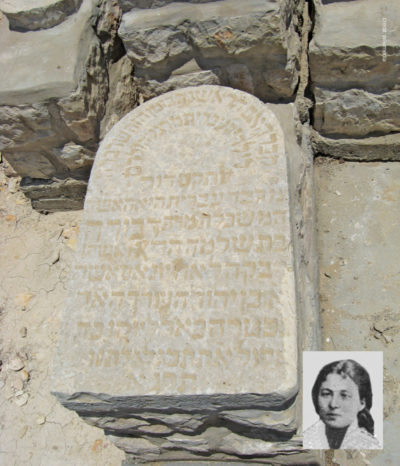
The Gravestone of Devora Ben Yehuda on top of the Mount of Olives. Insert: one of very few pictures of Ben Yehuda’s first wife.
YOU MAY NOT BURY HER HERE!
The Ashkenazi undertakers placed the body of his wife on a stretcher and began to walk in the direction of the Mount of Olives. Following behind, Eliezer had only two people with him—his oldest son, Ben Zion, and his friend, Nissim Behar.
As they walked towards the cemetery, a stranger joined them. He was a tall, thin man wearing a black robe and a black, wide-brimmed hat. This stranger was singing from the book of Lamentations. To Eliezer and his son, his voice was so soft and deep that it seemed to come from another world.
Halfway up the Mount of Olives, a group of Orthodox awaited them. They blocked the carriers, waving their fists at Ben Yehuda. They shrieked that since Ben Yehuda was under a rabbinical ban, his wife could not be buried on the Mount of Olives.
NO RABBI INVITED
Furious, Ben Yehuda rushed alone back down to the Old City, and quickly returned with Sephardic undertakers. A fist fight broke out while the nine-year-old boy stood by his mother’s body, wondering where she could be buried. All the while, the stranger was chanting Lamentations.
Finally the Ashkenazi mob relented and allowed the body to be carried to the top of the Mount for burial. But Ben Yehuda did not bring a rabbi or a prayer book to the grave site. As the two men and one boy stood silently, the man in black sang Proverbs 31: An excellent wife, who can find?
As they walked back to Jerusalem, Eliezer turned to invite the stranger for a cup of tea in his home. The stranger was gone. His identity remains a mystery to this day to the Ben Yehuda family.
BEN YEHUDA’S TRIBUTE
Subscribers of The Deer waited impatiently to read what Ben Yehuda would write about his beloved Devora. But after the seven days of mourning (Shiva) the next issue of his newspaper made no reference to her passing, or the controversy with the Orthodox over her burial. Instead, Eliezer placed in a black border the verse in Jeremiah 2:2:
I remember thee, the kindness of thy youth, the love of thine betrothals, when thou
wentest after me in the wilderness, in a land that was not sown.
After the mourning period, Mother Jonas packed her bags to return to Moscow. She could not bring herself to tell Eliezer about Devora’s last wish for him to marry her sister, and left for home.
Eliezer’s mother, Feyga, stayed on. But she was not allowed to speak to her grandchildren because of her lack of ability to speak Hebrew.
Within two months, a terrible epidemic of flu hit Jerusalem and three of his five children died. They were buried next to their mother on the Mount of Olives. Eliezer began to cough and bleed again. The Orthodox community heard the news of Eliezer’s failing health with joy and satisfaction. God had vindicated them of their enemy. “Soon,” they said, “we will be rid of this man and his heretical ideas forever!” Indeed, their struggle against him had just begun.
FATHER OF THE MODERN HEBREW LANGUAGE: PART 5BEN YEHUDA'S NEW VIRTUOUS WIFE
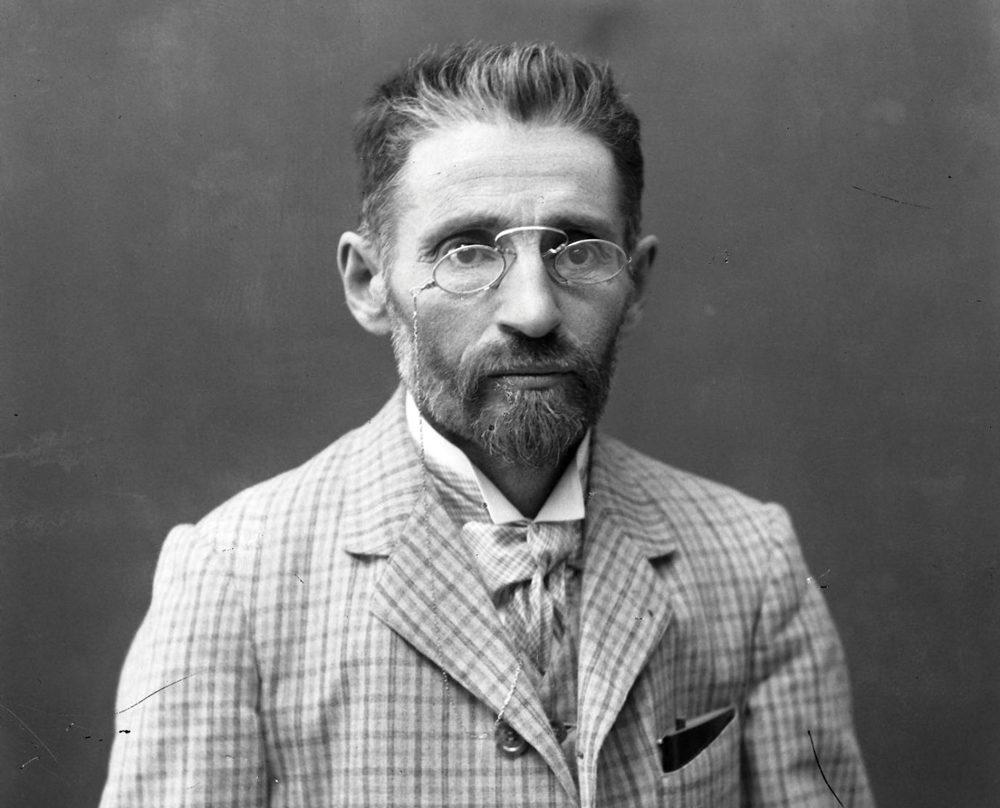
Believe it or not, Eliezer Ben Yehuda had very little success with spreading the Hebrew language during his first 20 years in Jerusalem. True, he had started an important weekly Hebrew newspaper (eight pages) coming out of Jerusalem. He had taught Hebrew as a spoken language to school children for the first time in almost 2,000 years. And he had begun work on a Hebrew dictionary.
He had even written articles urging the Jews to create a nation state in Israel 19 years before anyone had heard of Theodore Herzl.
But when he arrived in Jerusalem, there were only about 25,000 Jews, mostly Orthodox, who themselves were fierce enemies of Ben Yehuda’s vision to make Hebrew a modern spoken language of the Jewish people. He and his wife had almost no friends, let alone allies.
But something was stirring. Amazingly, during that same year Ben Yehuda came to Israel, 1881, the first wave of Jews (called The First Aliyah) started “coming home.” Over the next 20 years 35,000 Jews immigrated—mostly young, bright, intelligent and idealistic—to farm. Yet few knew anything about agriculture and before long, half had returned to Eastern Europe.
Due to the primitive and filthy conditions of Jerusalem where the Ben Yehuda’s lived, his first wife Devora, and three of his five children, died in the first ten years. Days before she died, Devora wrote a letter to her sister Paula Yonas, living in Moscow, begging Paula to take her place and marry Eliezer to help him accomplish his life’s mission to resurrect the Hebrew language.
It is not clear whether Paula or Eliezer corresponded first, but soon rumors were spreading in Jerusalem that the widower’s shoulders were less stooped, his eyes were again sparkling and his walk brisker. Letters crisscrossed the Mediterranean between Hemda (Paula’s new Hebrew name), and Eliezer.
Eliezer’s best friend Nissim Behar had a long talk with him. “Eliezer, how can you think of marrying this young girl of 19 after her sister died from contracting tuberculosis from you? I’m telling you this because your own doctor begged me to talk to you. You know yourself that you could die at any time. You must cancel this wedding.”
And so Ben Yehuda did what he felt he must. He wrote Hemda, telling her what the doctor had said. The wedding was off. He gave the letter to the doctor to mail, fearful he might fail to mail it.
HEMDA DECIDES
His two remaining children were puzzled. Their father was no longer excited and would not answer when the children asked about their new mother’s arrival. For two weeks, silence. Then one day a cable came. BE CALM. LETTER FOLLOWS, HEMDA.
Hemda had announced to her mother and father that she was determined to marry Eliezer and move to Jerusalem to be a mother to the two children. Her parents were shocked beyond words. Was she going to be another martyr to tuberculosis? But when they saw her unrelenting resolve, Solomon and Rivka Yonas decided to make aliyah together with Hemda and their two younger children! This was a unique family—willing to travel to “the ends of the earth” so their second daughter could marry a genius, but nevertheless, a very sick man.
You may be able to guess what Eliezer’s first serious conversation was with Hemda. He told her she would not be allowed to speak to his children until she learned Hebrew!
MOVING IN
So there they were in Eliezer’s small house: Hemda’s parents and siblings and Eliezer’s mother all now living together—and none of them could speak Hebrew except Solomon, and his Hebrew was elementary.
Eliezer solved the problem. He moved the printing press for his newspaper into their home and five pressmen came to work every day with instructions that they could never speak a word of any language other than Hebrew. And he told his Syrian servant who ran errands for him that he must be with his children from the time they arrived home from school until they went to bed.
STUDYING HEBREW
Hemda quickly realized it was up to her to decide whether the Ben Yehuda home would remain a Hebrew household or not. So she spent almost all of her time studying Hebrew. Often she cried in frustration that she wouldn’t be able to learn the language and complained to Eliezer that Hebrew grammar was next to impossible.
But day after day he gave her lessons. He taught her first to read the entire book of Genesis, and each day gave her a sprinkling of purely household words to learn.
After three months, she made an announcement to Eliezer—she was ready now to speak only Hebrew to him. And if he spoke slowly, she felt she could understand.
After six months, she made another announcement. She would from that day forward speak only Hebrew, not just with her husband, but everyone else she met. And so he took her to visit Jaffa and the new Jewish settlements near the coast to show off his bride’s Hebrew!
Some people didn’t believe she had studied Hebrew for only six months, and even accused Eliezer of playing a joke on them. Nevertheless, the impression she made on people was enormous. Here was proof that Hebrew is a language that even adults could learn and speak. If she could do it, others could, too.
THE DICTIONARY
Hemda began to grasp the monumental importance a Hebrew dictionary would be to a reborn nation of Jews. But how could Eliezer publish a Hebrew newspaper—a full-time job—and at the same time create a first-ever dictionary of modern spoken Hebrew? Especially since most of the words that would go into the dictionary had not yet been created! She, who had just learned Hebrew, realized she would have to help write and publish his newspaper The Deer in Hebrew so he could concentrate most of his time on the dictionary.
And so just over a year after she married, she began writing simple articles that Eliezer edited and corrected—and voila! A new Hebrew journalist! In every way, she became a first-class writer and entrepreneur. She even found some clients to advertise—also a first in Jerusalem—as she knew the main issue was always financial.
At one point, her father also wrote articles for The Deer. At the time of Hanukkah, he wrote an article on the victory of the Maccabees with the rededication of the Temple. Taking inspiration from their ancient forefathers, Solomon wrote, “We must collect our forces and move forward.” Now, it so happens that the word “forward” in Hebrew can also mean “eastward”—as in “towards Turkey!”
When the Sabbath ended, Jerusalem’s ultra-Orthodox leaders who despised Ben Yehuda for trying to make the Hebrew of the Bible into a modern everyday language, went straight to the Turkish authorities and “exposed” Ben Yehuda’s attempt to stir up an armed revolt against the Turks!
IMPRISONED FOR TREASON
Sunday morning, Turkish policemen knocked at his door and took him to jail. He was booked for treason, with the possibility of execution.
His closest friend, Nissim Behar, sent an urgent plea for help to the rich and powerful Baron Edmond Rothschild in France, who, through his philanthropy, supported the poor in the Land of Israel, especially the Orthodox.
Behar also put out an immediate call to secular Jews of Palestine for a “go fund me” to pay for bribes needed to obtain visitation rights to Eliezer and prepare him for what he was to say at his trial.
The money came quickly. Hundreds of secular Jews from the First Aliyah came from all over the country to protest the arrest. A Jewish man and his Arab partner set up a special café outside the prison so Ben Yehuda’s visitors could get coffee and refreshments. Many Arab officials who were friends of Eliezer risked the ire of the Turkish government by openly lining up on Ben Yehuda’s side. Christians offered their help. Amazingly, the issue brought the Jews together in unity—except for the ultra-Orthodox—in a way that had not been seen before.
For eight days the emaciated, consumptive editor was kept behind bars. The first night he was thrown in a tiny cell with 15 assassins, so crowded that he had to remain standing all night, his face thrust against the small opening at the top of the door in order to breathe.
However, the next day the prison doctor, with a sizeable bribe, pronounced Ben Yehuda’s tubercular condition endangered the lives of the condemned murderers. They isolated him in his own jail cell.
WORKING IN PRISON
Hemda took a rug, bed, mattress, chair and worktable, with other amenities such as bed linen, a lamp, books, ink, paper, and a small oil stove on which to make tea, so he could continue his work. Eliezer grew calmer with every passing day, satisfied to work on his dictionary in his cell as long as need be.
At the trial of Ottoman Empire vs. Eliezer Ben Yehuda, it was clear to the Turkish authorities that the ultra Orthodox Jews had officially excommunicated him. However, surprisingly, the Ottoman judges decided he was not a dangerous rebel, but he was a troublemaker. They sentenced him to one year in prison. Secondly, his newspaper that caused all this trouble would be suspended for a year!
Everyone knew the trump card was in Baron Rothschild’s hand because of his financial support. He was deluged from both sides with cables and letters. No response came from the Baron until one day the Orthodox rabbis received a cable. It said, EXERCEZ VOS PRIERES. BARON ROTHSCHILD. Translation: “Stick with your prayers.” In other words, stay out of what is not your business.
Suddenly the Ashkenazi Orthodox who were dependent on the Baron’s good graces, backed out of the whole thing and the Chief Sephardic Rabbi publicly renounced the ban.
BRIBES ARRIVE
Ben Yehuda went back to working 18 to 19 hours a day on his dictionary. As the appeal to his sentence drew near, the Baron sent a check for 10,000 francs, half of it for bribes. Ben Yehuda was pronounced innocent. However, the court declared he couldn’t publish his newspaper for one full year—another four months!
At the end of the four months, he received more terrible news. The governor of Jerusalem decided arbitrarily to close his newspaper for another year. Ben Yehuda was disconsolate. But Hemda, always his encourager, told him this was surely Providence’s way of forcing him to concentrate totally on the really important task—his dictionary.
Six months later, with another bountiful bribe from Rothschild, he received permission to continue his newspaper. Jews throughout the country and in Europe who had depended on this newspaper for news from the Holy Land were thrilled, and The Deer was more popular than ever. With Eliezer and Hemda’s ingenuity and enthusiasm, a flood of articles by young Jewish writers contributed to The Deer. Many who became celebrated in the field of Jewish literature got their start through the little Jerusalem weekly.
DEATH ON THE COAST
Still, disease hounded the family. Hemda’s father missed a boat that was to take him back to Russia for a season. Waiting for the next boat in Jaffa, he caught some disease and within a couple of weeks, died. Two of Hemda’s five children died of pneumonia. Hemda herself suffered for years from malaria and rheumatism.
Throughout the country, there was nothing accomplished without incredible struggles and a high cost in Jewish lives. Some newly established settlements were completely wiped out. Every single person in the village of Hedera (now a thriving city) died of Yellow Fever.
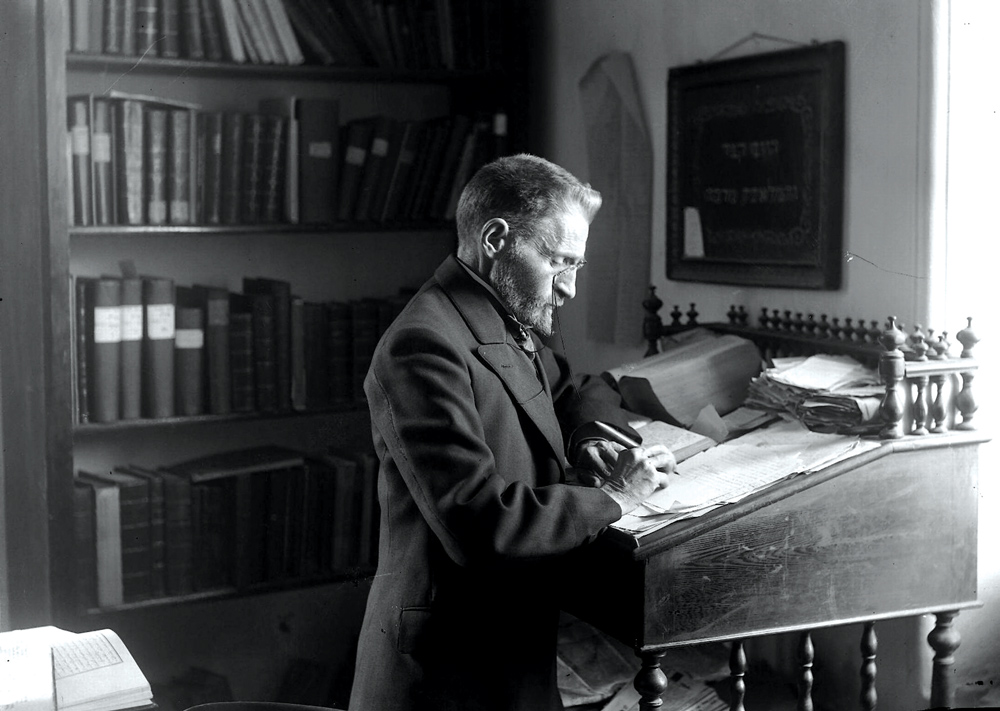
HERZL RISES TO LEADERSHIP OF THE ZIONIST MOVEMENT
In 1896, Theodore Herzl, now known as the father of the modern state of Israel, wrote a bombshell book called The Jewish State. That was the beginning of the awakening of the Jewish people to return to their ancient home. He followed up with a call for a First Zionist Conference of Jews to take place at Basel, Switzerland, in August 1897.
It was natural that Ben Yehuda would attend that First Zionist Conference. But he couldn’t go! He had thought he should become as “native” as possible in the ancient Land of Israel and had taken on Ottoman citizenship early on. Now they denied his leaving the country.
Herzl wrote Ben Yehuda, letting the editor from Jerusalem know he had been unanimously elected a member of the executive board. Ben Yehuda was very honored, but alas, if he accepted the membership, his days of activity in Palestine would quickly come to an end. In fact, he was warned not to ever mention the word “Zionism” in his newspaper.
And now an added worry arose; Hemda became pale and thin with reoccurring malaria and rheumatism. And so on the spur of the moment he decided to take her to Europe. In fact, they spent six months there, while Eliezer researched ancient Hebrew words in the top museums and libraries of Europe, and conferred with the most renown Orientalists in the world.
SEARCHING FOR HERZL
While in Europe he had a burning desire to meet with Herzl as he esteemed him as the leader of the whole Zionist movement, to which Ben Yehuda had dedicated his entire life. He agreed completely with Herzl’s vision of a homeland for the Jewish people. But Ben Yehuda was deeply concerned that Herzl never mentioned once the importance of the Hebrew language in bringing the Jewish people together.
In England, he visited Dr. Max Nordau, right-hand man of Herzl. Eliezer spent much time explaining the critical importance for a Jewish national language and Hebrew dictionary and Nordau agreed. Dr. Nordau encouraged Eliezer to go to Basel and talk to Herzl himself.
Wearily, he said he would go. He and Hemda traveled to Basel, but when they arrived, a friend told them Herzl had left the day before for Vienna.
The friend quickly sent a telegram to Herzl saying the Ben Yehuda’s were on their way to Vienna to visit him. But when they reached Vienna they received another blow. His wife said he had left for an important interview with Emperor Francis Joseph. Herzl told her to urge them to come to the Hotel of the Three Kings in Ischl.
Back at the railway station, the Ben Yehudas just missed a train, and had to wait several hours for the next one.
Upon arrival, they went straight to the hotel. The concierge told them, “You no doubt are the people Mr. Herzl went to the train station to meet. But when you were not on the train, he expressed his regrets, as he had to go back to Vienna and then to Basel.”
Eliezer didn’t have enough money to keep traveling. They headed home to Jerusalem via Constantinople.
WAITING FOR NEWSPAPER PERMIT RENEWAL
Eliezer decided to stay in Constantinople to renew his permit to publish The Deer while Hemda returned home. Coughing blood night and day, he became confined to his bed for eight months. Eliezer was a very sick man.
As fate would have it, Theodore Herzl came through Constantinople on his way to meet again with the German Kaiser. But Eliezer was too sick to meet him! Furthermore when Herzl finally visited Jerusalem, Eliezer was still in Constantinople. Even Hemda could not attend any of the receptions for the honored guest because she was in bed waiting the birth of their fourth child. Herzl sent word that he would visit Hemda in their home. But he never came.
Finally after he recovered, Ben Yehuda decided that he must talk face to face with Herzl. He must find him at any cost and explain why a spoken modern Hebrew language was the strategic key to a national movement of Jews returning to the Holy Land.
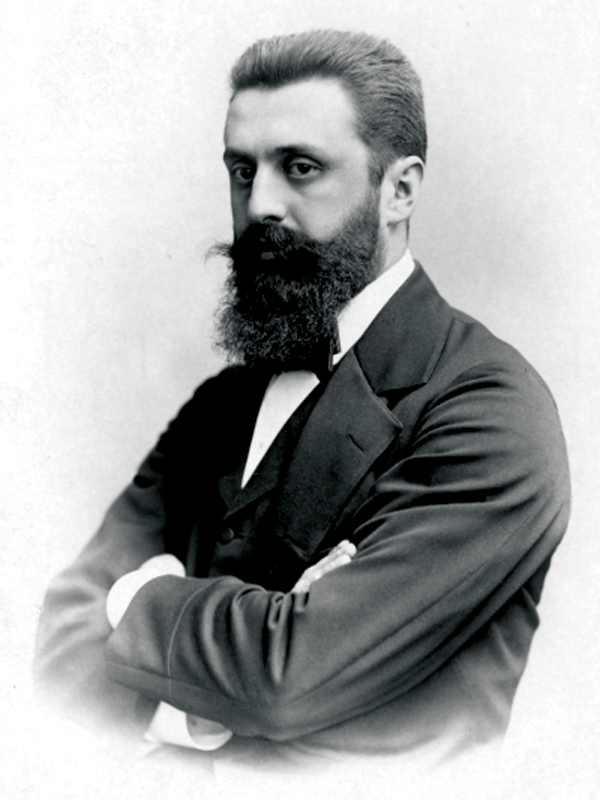
Theodor Herzl
HERZL AT LAST
He took a train from Turkey to Vienna, and there the two men finally met. Ben Yehuda laid out in great detail his plan for uniting the Jewish people through one language—Hebrew. He told how his life’s work was to print a worthy Hebrew-language newspaper and create a Hebrew dictionary. He told how he was pushing schools in the Land of Israel to teach in Hebrew and how he was creating committees to decide on Hebrew words, and encouraging teaching the arts and literature in Hebrew, and even helping the early Jewish farmers to learn Hebrew.
But Herzl simply couldn’t see it. He was convinced the best language for a future state was German. Herzl’s focus was to convince German royalty to pressure the Sultan into giving the Jews a charter for their homeland. Eliezer Ben Yehuda knew it was not going to happen. He left for home a broken man.
Herzl wrote of this visit in his diary: “I also met a young fanatic who tried to convince me that what our movement needs is to adopt Hebrew as our national language. It is, of course, ridiculous!”
ELIEZER DEVASTATED
Eliezer’s letter to his wife was quite different: “The situation is desperate. Herzl is convinced he will succeed in buying a charter from the Turks and will not talk about anything else. He has no interest in either the newspaper or the dictionary. We are indeed an unfortunate people.”
Ben Yehuda never saw Herzl again. It is said by a few historians that Herzl later understood his mistake and even took some Hebrew lessons himself, besides making sure his children learned Hebrew.
What we do know is that Ben Yehuda always stood with Herzl and saw him as leader of the Zionist movement. Though Herzl never once recognized any of his activities and efforts for the cause, when Herzl died in 1904, Eliezer mourned deeply the father of the Zionist movement.
FATHER OF THE MODERN HEBREW LANGUAGE: PART 6ELIEZER BEN YEHUDA'S DESTINYTWO STEPS FORWARD, ONE STEP BACK
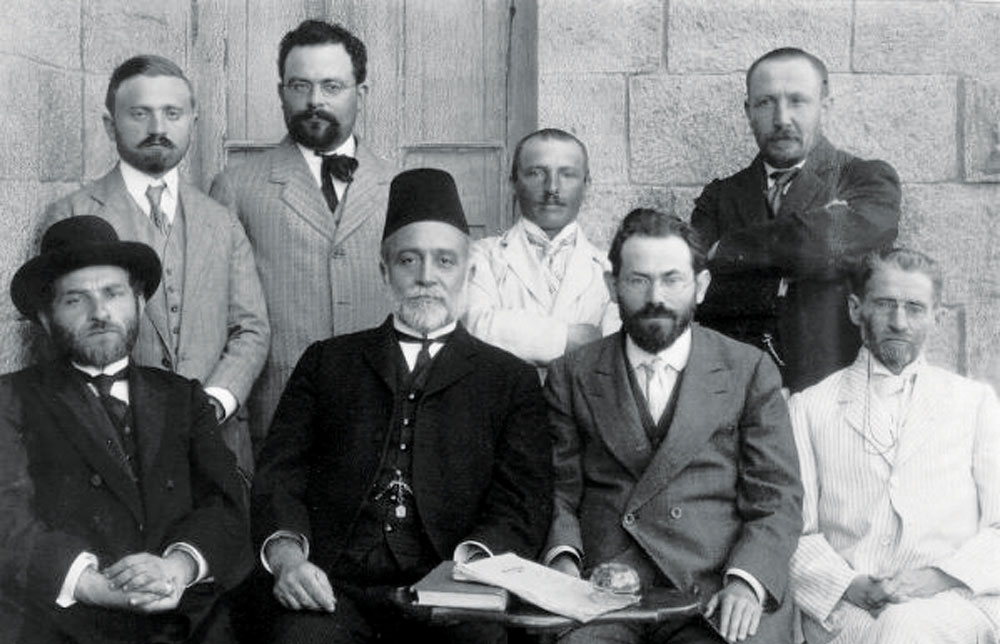
Eliezer Ben Yehuda foresaw the need for a committee which would oversee the nascent modern Hebrew language, as thousands of words would constantly be added to the limited vocabulary of the early 1900’s. Also this committee would have to determine correct pronunciation, as the few thousands Hebrew-speaking Jews of Palestine came from different countries and therefore many different accents. Ben Yehuda established “The Hebrew Language Council” in 1912, which became the Academy of Hebrew Language in 1953, and is today the supreme institution for scholarship on the Hebrew Language.
When Theodore Herzl, considered the Father of Modern Israel, died in 1904, Eliezer Ben Yehuda went into deep mourning. Although Ben Yehuda had dreamed and worked for a Jewish state nearly 25 years before Herzl appeared on the Zionist horizon, Herzl was his leader—the man who could lead the Jewish people back to their homeland.
Yes, in 1878, Eliezer had written his first passionate appeal “A Burning Question,” calling the Jewish people in the diaspora to come home. But not only were the Jews dispersed; in many ways they were hardly a people group. They spoke countless languages and dialects, were scattered around the world, and many Jewish leaders of the 19th century strongly advocated that all Jews simply assimilate where they lived to avoid more persecution.
It was Herzl who made the clarion call in 1896 that resounded around the world. He warned there was no other solution to prevent the extinction of his people except to return to their ancient homeland. But even Herzl laughed off Ben Yehuda’s burning passion to resurrect the Hebrew language as a catalyst to help create a new nation. For Herzl, resurrecting a dead language was simply so far off the radar of possibility that he was convinced the best language for a new Jewish state would be German.
As Eliezer reflected upon the death of Herzl, he pondered his own situation. He realized that in the last quarter of a century, he had actually accomplished very little, except that he and his second wife and six of his 11 children were alive. They did all speak fluent Hebrew. But the truth was, there were only a few hundred fluent Hebrew speakers in all the land of Israel.
HE KNEW HE HAD FAILED
Eliezer lost all hope. His wife Hemda actually caught him preparing to burn up the entire manuscript for the first volume of his Hebrew Dictionary! She screamed and he dropped the box of matches.
Today we would call it a nervous breakdown. He told Hemda, “I know now I have made a mistake ever trying to do it [resurrect Hebrew]. If it were not a mistake, the opposition would not have been so great.” He wanted to die.
“But what about the great heritage you would be leaving in creating the first Hebrew dictionary in the world? What about the work you have been doing since you came to Israel?” Hemda shouted.
“What is life worth if I cannot serve my people?” he responded. “They refuse to be served! What is the Hebrew language for if no one wants it? What is a dictionary for? Who will use it?”
And, besides all the disappointments of so few people understanding the existential necessity for the Hebrew language to unite his people, the Ben Yehuda family was deeply in debt, with no foreseeable way to pay their anxious creditors.
HEMDA GOES ITINERATING
Out of that conversation, Hemda decided to leave for Europe and search for benefactors to sponsor the publishing of Volume One of the Ben Yehuda dictionary. She had very little money, and she was quite aware that interest in the Hebrew language becoming a spoken tongue in Israel was minuscule. But the woman was brilliant. First she visited Budapest where she met with a famed Orientalist scholar with whom Eliezer had been in correspondence.
The professor and three of his colleagues spent a week looking over the manuscript. Their verdict? “Ben Yehuda was making the most important contribution of his generation to the science of languages.” Now she had a perspective that no one had considered—scientific value.
With those recommendations, she landed an appointment in Berlin with the famed Langenscheidtsche Verlagsbuchhandlung, a long-established house specializing in publishing dictionaries. This prominent house agreed that if Ben Yehuda would provide the typesetting, they would take on the project. (Famed though they were, they obviously didn’t have a Hebrew typesetter.)
However, Hemda would have to raise the money for publication. She traversed Europe, knocking on doors of wealthy Jewish professors and businessmen. She was an attractive lady, in her mid-30’s. Even more so, she was convincing and determined. After four and a half months, she succeeded in raising the equivalent of $2,000—enough for Volume One.
HIS PASSION RENEWED
When Ben Yehuda received a telegram of success from Hemda, he sent back this reply: “Is this reality, or shall I awaken to find that I have been dreaming?” On his fiftieth birthday, he began typesetting Volume One of his dictionary. And now he worked with renewed fire in his soul.
When every new volume was ready, crisscrossing Europe, supplicating and imploring for financial aid became their routine. Hemda had to leave the children with her mother-in-law for months at a time. Sometimes, she traveled alone. Sometimes with Eliezer, who settled in at the closest library for more Hebrew roots in dusty archives while Hemda hunted for contributors. Truthfully, she grew weary of this need of being a one-woman, self-perpetuating fundraising organization. But she accepted it as her role in life.
Very slowly, a few settlements in central Israel began to earnestly teach Hebrew in their local schools. With great satisfaction, Ben Yehuda watched a number of pioneer families painstakingly train their children in the Hebrew language. But then, to his consternation, they would send them off to college in Europe. Sure enough, few young natives of Palestine ever returned.
BEN ZION IS SENT TO EUROPEAN UNIVERSITY
Ben Yehuda took the chance with his own eldest son and sent him to a European university, convinced that his “first Hebrew child” was so deeply wedded to the language and land of Israel he would be back. And that is what happened. He returned at 25 years old a thoroughly experienced journalist and took over Ben Yehuda’s newspaper, developing it into a daily, called The Light. The journalism and the dictionary were the two strongest enterprises that gave Ben Yehuda the momentum to raise Hebrew from its 1800-year sleep.
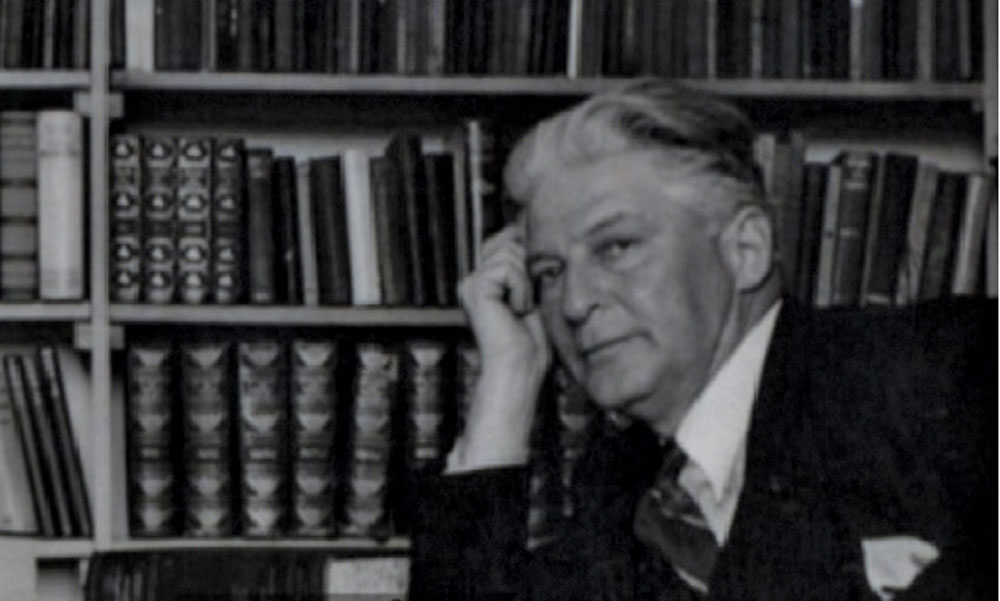
Eliezer and his first wife’s first born, Ben Zion, became the “first Hebrew child” (speaking Hebrew as his first language). He became a known journalist and owner of several Hebrew newspapers, following in his father’s footsteps. He eventually changed his name to Itamar Ben Avi.
CHANGES IN THE AIR
As we have mentioned, Theodore Herzl, who died in 1904, had no interest in the Hebrew language, to Ben Yehuda’s great sorrow. But seven years later, the new president of the World Zionist Congress was none other than Professor Otto Warburg, a very wealthy and brilliant scholar who financially made it possible for Ben Yehuda to publish Volume Three of his Hebrew Dictionary!
Secondly, in 1908, the Young Turks Revolution brought a new liberty to write freely about Zionism in Palestine. However, with this new freedom of speech, Hebrew newspapers were popping up everywhere, much to Ben Zion’s dismay! But Ben Yehuda told his son that every progressive step to help Jews in the Land of Israel speak and read Hebrew was definitely beneficial for the Jewish community.
Ben Yehuda didn’t have a jealous bone in his body—one of the most amazing characteristics of his genius. Every new effort by any Jew to promote any form of cultural or economic advancement towards creating a Jewish nation was backed and vigorously supported with every fiber of Eliezer’s being.
ART ARRIVES IN JERUSALEM
One day Boris Schatz, an attractive young man from Bulgaria, appeared at the Ben Yehuda home. Schatz was a sculptor; he and his friend Efraim Lilien came to open a school of arts and crafts in Jerusalem. They envisaged the creation of a national style of art blending classical Jewish/Middle Eastern and European traditions—to create a Jewish art. He had brought with him ten other enthusiastic young Jews from Europe. Up until these young men (and one woman) arrived, there was no such thing as art in Jerusalem—or any other place in Israel.
Boris laid out his vision in a bad mixture of Russian, French and German. But Ben Yehuda sat for six hours transfixed, discussing the project with him. Ben Yehuda agreed to give it his full cooperation—on one condition: that the school would be taught completely in Hebrew! Schatz was shocked and explained that not one of them knew a word of Hebrew. So Ben Yehuda brought Schatz into his home and for six months virtually “locked him up inside his house,” teaching him and his artist friend Hebrew. The ten students were lodged in a Jewish school, as this was summer vacation. They slept on mattresses, and a communal kitchen was arranged with a teacher of Hebrew conducting classes and cooking for them. Hemda became the first secretary for the art school.
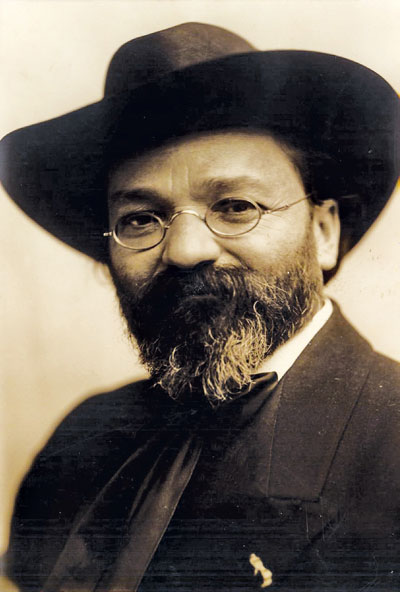
Boris Schatz, early pioneer and sculptor, founded in 1906 what later became the world famous Bezalel Academy of Arts and Design. Schatz named it after Bezalel who designed the Tent of Meeting for Moses.
The ultra-Orthodox were dismayed beyond measure for this invasion of such idolatry. On the other hand, the women of Jerusalem began buying pictures or needle work to place on the barren walls of their homes. Today, the Bezalel Academy of Arts and Design is a world-renowned institution.
Ben Yehuda helped young Jewish immigrants find work to survive, to attend Hebrew classes, and acquire new occupations so they could become farmers or start small businesses. Above all, he demanded they learn Hebrew! Soon many of these young zealots moved into the new settlements, making sure their children learned Hebrew at their new schools.
THE WAR OF THE LANGUAGES
As the Hebrew language slowly became more prominent, the tension between which language—German or Hebrew—would become the national language of the Jews of Palestine came to a head in 1912. There was an intense scholastic war as wealthy German Jews prepared to create a magnificent university in Haifa on one condition: that all subjects would be taught only in German.
But by now, there were a few thousand local Jews and their children who were already fluent in Hebrew, and they were determined that all schools teach at least some subjects in Hebrew. A delegation from the World Zionist Congress, which by now had caught the vision of the Hebrew language, pleaded that Eliezer pick up his pen and stir up opinion against the use of the German language in Israel. Even though Eliezer knew that contributions of wealthy German Jews were still sorely needed to continue publishing more volumes of his dictionary, he drew a line in the sand against German becoming the foremost language in the Land of Israel.
A nationwide strike of schools erupted with students burning their German textbooks. Of course, Ben Yehuda was in the middle of the fight, threatening that blood would flow. In fact, his home became general headquarters. Councils of war were held late into the night. Finally teachers and students took to the streets in a general strike shouting in Hebrew, “Down with the Germans,” and “Hebrew must live.”
Sure enough, the Germans threatened to discontinue the publishing of more volumes of Ben Yehuda’s dictionary. But there was no stopping the man. He directed the opening of “emergency” schools across the country with all instruction in Hebrew. In some, wooden boxes had to be used for seats. Slowly, the agitation diminished. German schools were reopened, but Hebrew was not dropped from the curriculum. Ben Yehuda, strangely refreshed, picked up his pen and went back to work on his dictionary. Hebrew reigned.
RELIEF FROM CONSTANT DEBT
It was time for Hemda to head off to Europe once more to raise money for the next volume. Eliezer decided to go with her. Again, he headed for the national libraries in each place and buried himself in ancient tomes that would yield new secrets of the beginning and continuation through the ages of the Hebrew language.
After visiting London, Hemda had enough funds to publish the fifth volume. Eliezer was full of excitement over his finds in the library at Oxford. A friend gave them first class tickets on a ship back to Egypt—the first time ever in their lives to enjoy such luxury.
It was a serene period in Eliezer’s life. For at least two more years they would not have to set out for Europe, hat in hand, for the next volume. The children were thrilled their mother wouldn’t be gone for months this time. Eliezer had placed a motto in front of his desk for many years that read: “The day is so short; the work to be done so great.” Now he changed his sign to: “My day is long; my work is blessed.”
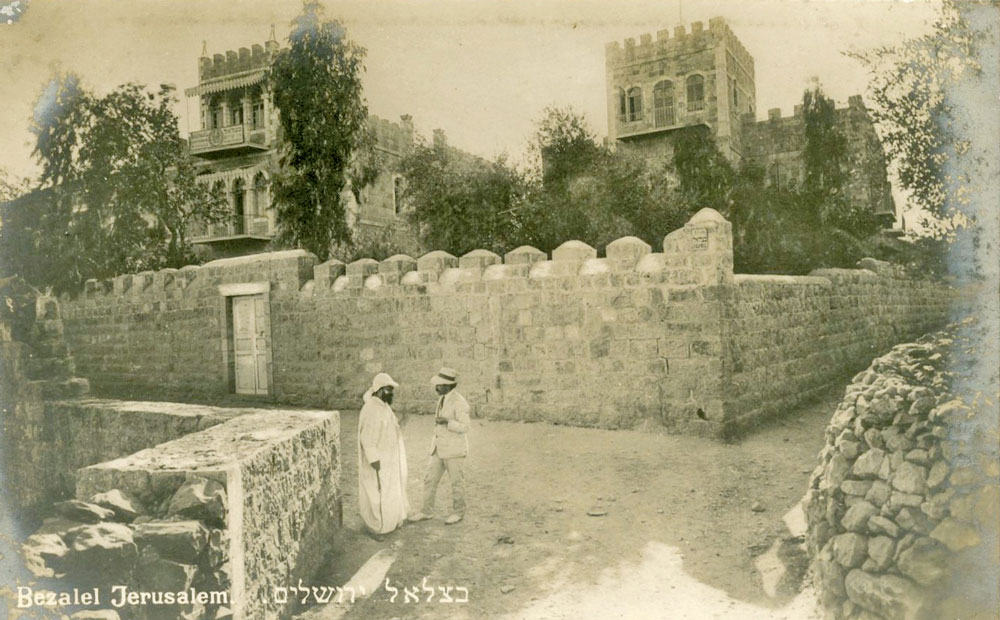
First Bezalel Campus, 1913
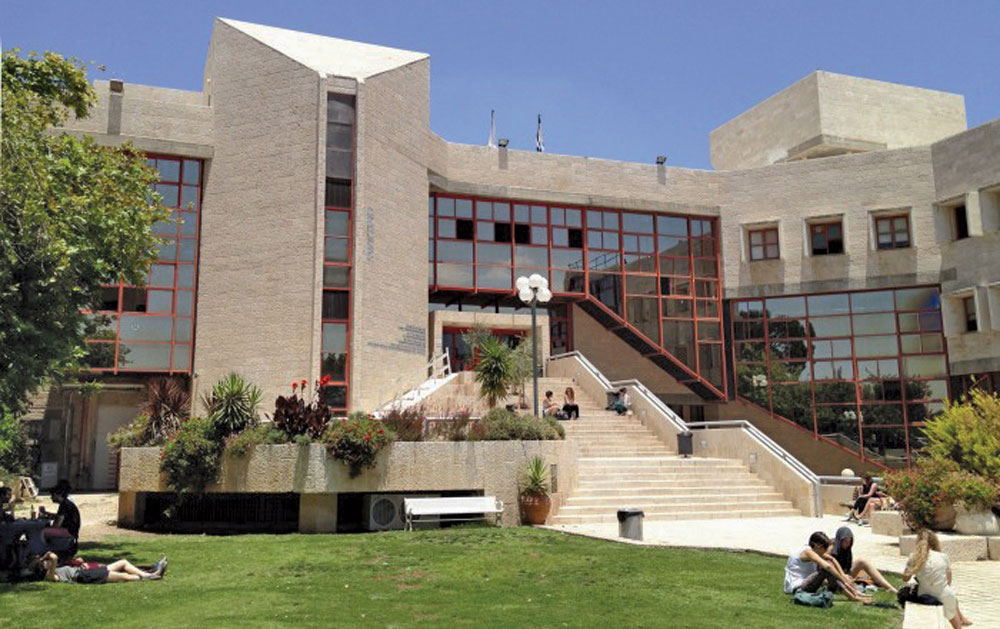
One of Bezalel Art Academy departments today
WORLD WAR I COMES TO PALESTINE
Eliezer and Hemda decided to take a real vacation. They sent the children to the Petach Tikvah settlement to stay with their close friends, and packed a trunk to take to Beirut. But as they arrived in Haifa to board the ship, they found the city in turmoil. Germany had just declared war on France, and England had declared war on Germany and Austria. Banks were closed. They had just enough cash to get back to Jerusalem.
Darkness settled over the Holy Land. The Jews of Palestine were isolated from the rest of the world. Ships stopped coming to her shores. Sugar, rice and kerosene could no longer be purchased. Turks were searching for anyone who could be accused of treason—meaning Zionist activists. It was rumored there was a warrant out for the arrest of their son Ben Zion, who was a known Hebrew-language journalist. They lost contact with their son Ehud who was studying in Germany. Again, Ben Yehuda felt his dream for a national home for his people that was just emerging, was threatened with annihilation. He had trouble concentrating on his research for his dictionary. Hemda was very worried for his health.
FATHER OF THE MODERN HEBREW LANGUAGE: PART 7ELIEZER BEN YEHUDA - THE SECRET TO HIS SUCCESS
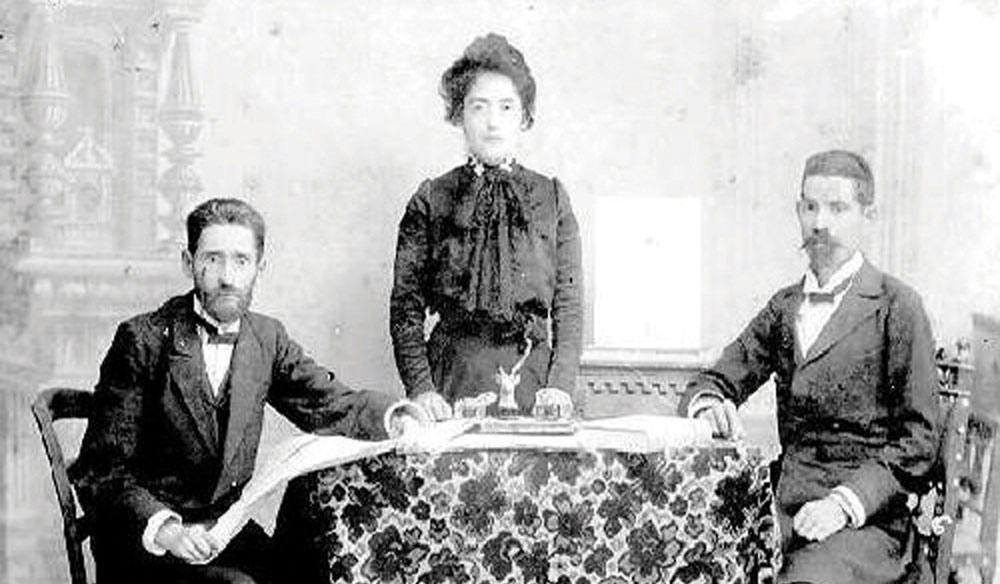
From left: Eliezer, wife Hemda, David Judelovitch, a former student of Eliezer who became one of the leading educators bringing Hebrew to the schools of the settlements.
Dreamer, Visionary, Teacher, Mentor, Lexicographer, Statesman, Organizer, Example, Scholar, Fighter, Humble Lover of His People, Student of the Bible
As the Great War spread to Palestine in 1914, the Ottoman Turks looked for spies and informers among the Jews of Jerusalem and the settlements. They saw Zionism as an enemy and Ben Yehuda was obviously at the top of their list. In fact, if it had not been for a bribe from the philanthropist Baron Rothschild eleven years before, Ben Yehuda would have been hung for treason. His son, Ben Zion, who had changed his journalistic name to Itamar Ben Avi, discreetly closed down their family newspaper as rumors spread that he might be executed as a traitor.
As the war continued, the Turks demolished the Jewish settlements, taking their animals and tools, cutting down the trees planted by the pioneers and destroying their crops. For Ben Yehuda, his dreams were crashing. For whole days he would not eat.
His wife Hemda was terrified that some Turkish officer might confiscate the manuscripts and notes for the remaining volumes of his dictionary, so she secretly took them to the American consul, who assured her they would be as safe as if in a vault in New York.
With no charity arriving for the ultra-Orthodox Jews and no banks open, famine and poverty, followed by epidemics such as typhus, infested the land. Incredibly, at the same time, a terrible plague of locusts covered the country, devouring what few crops were left.
Hemda was so worried for Eliezer’s health and safety that she suggested they leave for America during the war. In the mayhem of Jerusalem, he had simply stopped working on his dictionary. In New York, Hemda explained, he could work on his dictionary in peace. But Ben Yehuda would hear none of it. He would stay with his people, especially in the current dire circumstances.
However, other Zionist leaders in the country were also worried about him and saw no reason to endanger the life of a national treasure. So they decided, together with Hemda, to officially appoint him to travel to the United States for the critically important mission of persuading the American Jewish community to stand with Britain, and not Germany, in the war.
Most Jews in Palestine hoped Britain would ultimately win the war, but they needed America. If, God forbid, Germany were to win, its ally, the Ottoman Turks would also win, resulting in the end of the Zionist dream for Jews to have their own nation in ancient Israel.
TURKS REFUSE BEN YEHUDA’S EXIT PERMIT
Finally, Ben Yehuda reluctantly agreed to go to America. But the challenge now became, how could he and his family sneak out of the country? Everyone knew the Turks, for their own reasons, would not allow him to leave. Nevertheless, they headed for Jaffa in the dead of night to take a boat. But the ultra-Orthodox reported their escape to the Turks who caught them when they were already on a barge heading for an offshore ship. On the second attempt the Ottoman military commander in the Haifa bay stamped Eliezer’s permit, “Dangerous Journalist, not permitted to leave from any Palestine Port!” and sent them packing back to Jerusalem.
The third time, two of Eliezer’s close Arab friends took the military commander out for a long, lazy supper while the wanted man and his family hopped on a boat half full of Jaffa oranges. It was only half full because the Jewish farmer thought it more important to get Ben Yehuda out of the country than to sell his oranges—an enormous economic sacrifice in those difficult days.
MEETING FEDERATION OF AMERICAN ZIONISTS
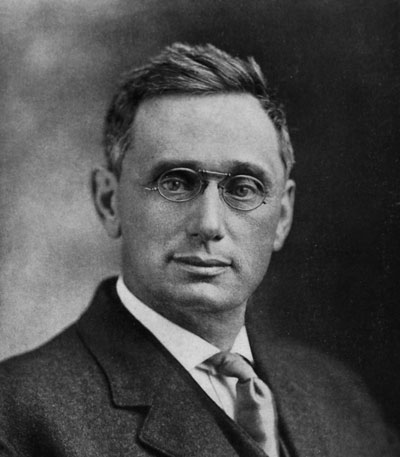
U.S. Supreme Court Judge Dr. Louis Brandeis
In America, Ben Yehuda was wined and dined like never before in his life. Many renowned Jews already knew Eliezer and Hemda, because distinguished scholars and politicians and leaders from around the world continually passed through Ben Yehuda’s Jerusalem home. So upon their arrival in the U.S., a large reception was arranged for Ben Yehuda to make a speech.
His passion and clarity of the dangers, challenges and possibilities for the Jews of the Land of Israel won the day. He pressed hard: “We Jews,” he said, “must show ourselves worthy to be entrusted with our own destiny.” In attendance was Dr. Louis Brandeis, confidante to President Woodrow Wilson and the first Jew to ever serve on the U.S. Supreme Court. He asked Eliezer to give the same speech to America’s premiere Jewish leaders sympathetic to Zionism. Three days later, these leaders declared themselves on the side of the Allies—an incredibly important win, which ultimately helped lead the United States to join the Allies.
FOUR YEARS OF CONCENTRATED WORK ON DICTIONARY
The affluent U.S. Ambassador for the Ottoman Empire, Henry Morgenthau, arranged a home for the Ben Yehuda’s and a special room in the New York Public Library with all the books he needed to work on his dictionary. From 9:00am – 6:00pm, Eliezer was able to work, non-stop, with no worry of food or shelter, and no harassing Orthodox or Turks at his door. Even though his previous notes were stashed away in the American Consulate in Jerusalem, he was able to complete most of his research for the remaining letters of the alphabet!
A massive celebration at Carnegie Hall was organized for Eliezer’s 60th birthday. He was praised by one speaker after another—likening him to the prophets of ancient Israel, who were often unpopular, but always true to their calling. And to top it off, America’s Jewish community gave them the princely sum of $10,000 to build their own home in Jerusalem!
BRANDEIS SPEAKS WITH PRESIDENT ABOUT ISRAEL
But Ben Yehuda knew he had one more task to fulfill. He must take advantage of his friendship with Judge Brandeis while he had the opportunity and implore him to use all his influence to convince President Wilson to recognize the legitimate rights of the Jews to a national life in their ancient homeland. Unsure, Brandeis asked Ben Yehuda if he actually thought Palestine’s Jewish community had enough of an infrastructure to actually establish a sovereign state.
Ben Yehuda answered, “Absolutely!” He explained that there was a vibrant generation of both young immigrants and those already born in the land. And he introduced his son, Ben Zion, who was immediately scooped up to be a spokesman for Israel to Jewish groups across America. So Brandeis opened up the subject with the president who was also quite incredulous about the viability of a Jewish state. Brandeis repeated what Ben Yehuda had told him—especially of the capable new generation of native Jews born and raised in Israel—referencing Ben Zion as an example.
BILLY SUNDAY AND BENNY SATURDAY
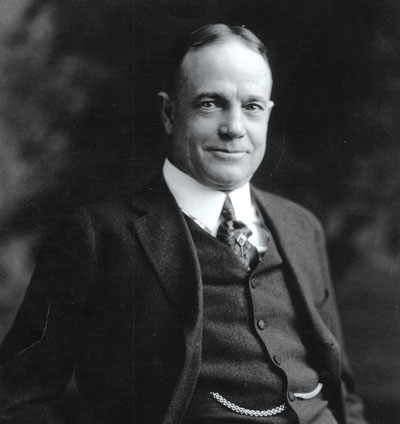
Evangelist Billy Sunday
For the strangest of reasons, President Wilson thought about Billy Sunday, the great American evangelist who happened to be in Washington, D.C. at that very moment, preaching the Gospel. Wilson told Brandeis if he could get Ben Zion on the stage to talk about Israel from a Biblical standpoint, the president would send him as a delegate to a conference to sort out the boundaries of nations after the terrible war. It happened! Billy Sunday, giving the stage to the young man from Jerusalem, said, “Here is a true Israelite from the land of the Bible! Won’t you welcome—Benny Saturday!”
Billy Sunday gave him a big hug, patted his back vigorously, and said, “Ben, tell them the truth!” Ben Zion quoted Ezekiel 37, and told his huge Christian audience that God was raising up from the dead a new revived nation of Jews in the Holy Land. The crowd roared its approval and shouted “Benny Saturday! Benny Saturday!”
And that is how Ben Zion, whose name was now Itamar Ben-Avi, became a representative of the Jewish Zionist movement sent by President Wilson to the Conference of Small Nations at the Paris Peace Conference.
Most importantly, 21,000 Christians at Billy Sunday’s tent meeting saw with their own eyes, the resurrection of the Jewish people as told by Ben Yehuda’s son, “the first Hebrew child,” some 30 years before the state was born.
THE BIRTH OF THE BALFOUR DECLARATION
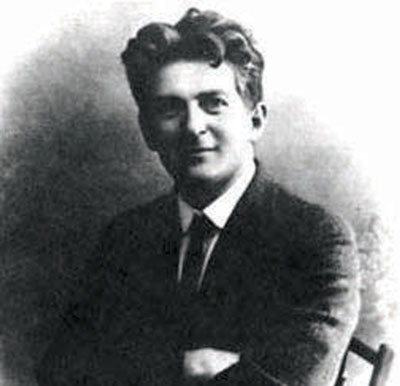
Itamar Ben Avi – originally Ben Zion Ben Yehuda
Nevertheless, momentum was building for the establishment of a Jewish state. England was winning the war. There were a number of Christian men in the British cabinet sympathetic to the Jewish people. Lord Balfour asked President Woodrow Wilson his thoughts concerning a Jewish state. Wilson was favorable. On November 2, 1917, Balfour announced that the government of Britain looked with favor on the establishment of “a national home for the Jewish people.”
Ben Yehuda, though still in the U.S. was ecstatic! He responded with a paraphrase of Psalm 126: “T’was like a dream when the Lord restored Zion from its bondage.”
Just two months later, the Turks surrendered the city of Jerusalem to the devout Christian, General Edmund Allenby.
GOING HOME
Ben Yehuda wanted one thing and one thing only—to go home. But it was several months before they could find passage on any ship. Hundreds saw him off at the New York pier.
When their ship arrived in Egypt, they took a train to the Palestinian border. At the front, the new British governor came to greet Ben Yehuda with an outstretched hand, saying with a broad smile on his face, “Shalom alechem [Peace be unto you]!” With all his visionary dreams, Eliezer never imagined a British authority would greet him in Hebrew!
Back in Jerusalem, reality hit. People wouldn’t speak to him because he had “fled” during the war. His house had been stripped because his secretary had sold furniture for himself and his family to survive. Only Eliezer’s library had not been touched as it had remained locked. But all the other rooms were filled with squatters, and it took a court case to get them out. Most important, his dictionary manuscripts were safely retrieved from the American Consulate.
SAN REMO—ONE OF THE MOST IMPORTANT DOCUMENTS EVER
But one of the greatest events of Eliezer’s entire life was about to unfold—the convening of the San Remo Conference. Although much less recognized and celebrated today than the Balfour Declaration, San Remo was far more important. True, the Balfour Declaration was the first public statement of support for the idea of establishing a national homeland for the Jewish people. But now 52 nations were gathered together to discuss the division of lands according to winners and losers.
The Jews of Palestine were interested in one thing. What was San Remo doing about a Jewish state? Again, Eliezer wasn’t able to eat, sleep or stand still. Not even to work on his dictionary. Then one morning Itamar came running into the house with a cable and announced that 52 nations had unanimously approved a British mandate over Palestine—to be governed along the principles set forth in the Balfour Declaration!!!
“I HAVE ACCOMPLISHED MY PURPOSE”
Eliezer could not contain his joy. According to his grandson’s book, Fulfillment of Prophecy by Eliezer Ben Yehuda II, he felt this was all the fulfillment of prophecy. The Messianic days were at hand. He exclaimed, “Now I have accomplished the purpose of my life, and I can die peacefully!”
The San Remo Resolution of April 1920, was certainly much more important than the Balfour Declaration in terms of international law. Think of it! Fifty two states ratified the Balfour Declaration and mandated that Britain prepare the way for a Jewish state. Moreover, on July 24, 1922, the League of Nations ratified the San Remo Declaration!
HEBREW BECOMES AN OFFICIAL LANGUAGE
Miracles continued to happen. Great Britain appointed Sir Herbert Samuels, a Jew, to be the British High Commissioner of the British Mandate. Soon after he arrived, Samuels invited Eliezer and Hemda to be his official guests for Sabbath services and lunch. He asked Ben Yehuda if he would teach him and his children Hebrew! It was then Samuels revealed he would officially announce that Hebrew would be one of the three legal languages of his government, along with English and Arabic. It happened on June 11, 1920. Eliezer’s joy knew no end.
Samuels did warn Ben Yehuda that now he would have to quickly come up with a whole lot of new words—like hospitals, health clinics, wire service, coffee shops, restaurants, and various government agencies. These were glorious days for Eliezer! Many of Palestine’s Jews were convinced their rebirthed nation was just around the corner.
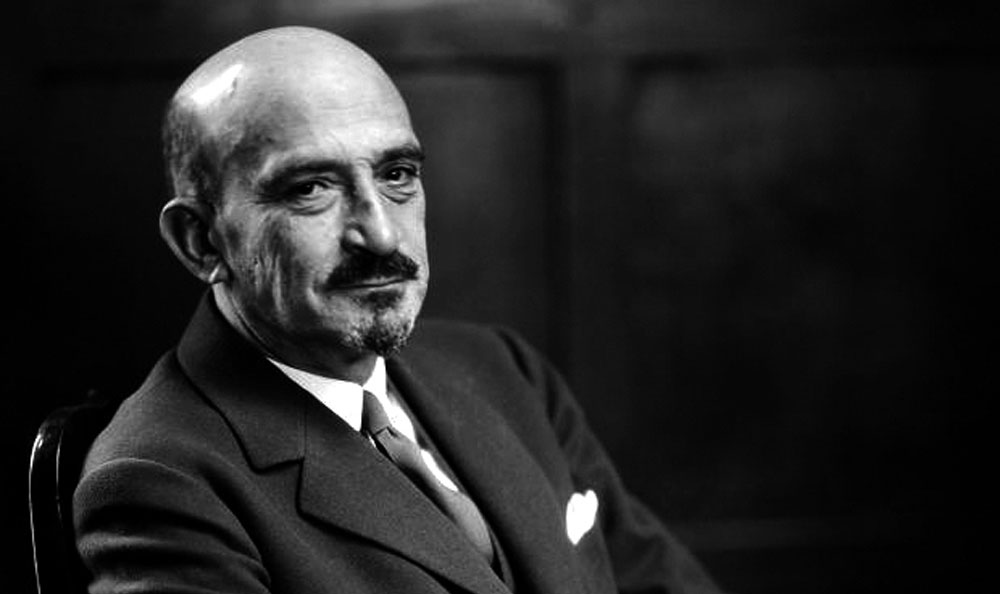
Dr. Chaim Weizmann, last person to visit Ben Yehuda as they discussed how to urge Jews to immigrate to the Land of Israel. He became the State of Israel’s first President.
ARAB VIOLENCE AND THE “WHITE PAPER”
But there were yet many challenges for the Jews of Palestine before that day would come. During Samuel’s five years of service, Arab violence and out-of-control riots convinced British Prime Minister Winston Churchill to deliver his tragic “White Paper” on June 3, 1922, declaring that over the next five years, only 75,000 Jews could immigrate to the Holy Land and after that, none would be permitted.
This was terrible news. Chaim Weizmann, the famous chemist who had a great influence on the creation of the Balfour Declaration. went to Israel and realized the Jews were not taking advantage of this small window of opportunity to immigrate to Israel. Jews were not immigrating for fear of the Arab riots.
Weizmann met with Ben Yehuda for several hours. He pleaded with Eliezer to write another clarion call for Jews to come home. No one but Ben Yehuda could pen such a passionate plea and this call was extremely urgent. “The time to come is NOW!” Weizmann implored. “The gates are open, and our people are not coming back. This is an opportune moment that will not last.”
Ben Yehuda was worn out. He was coughing constantly, and each bloody cough further weakened him. But when Weizmann insisted, Ben Yehuda answered, “You are the leader. Your wish is a command. I shall write it for you.”
For three days, Ben Yehuda tried to write an article. But it wouldn’t come. His mind was blank. Hemda came to his study at midnight and told him he could write the next day, but now he must sleep. He lay down on a nearby couch. But in a short while, he called Hemda. He was having trouble breathing. The call for help was instant, and soon five doctors were caring for him while the children gathered around. He was given oxygen and for a minute his eyes brightened and he said in Hebrew, “I believe!” He sank back onto the couch where he was resting. In a few minutes he was gone. It was December 16, 1922. He was 64 years old.
FIRST STATE FUNERAL OF JEWISH “NATION”
Suddenly his greatness was recognized! At his funeral, 30,000 Jews and Arabs followed the procession to his grave on the Mount of Olives. Settlers from around the entire country came—even the ultra-Orthodox. It was truly the first state funeral of the Jewish nation! Palestine was ordered to observe three days of national mourning.
The Jews of Palestine would have to wait another quarter century to see their nation birthed. But all the schools in Palestine were already teaching in Hebrew. Eliezer and Hemda had produced five volumes of his dictionary. And he had prepared the material for another eleven volumes. The courts, the theater, business, society and public affairs were being conducted in Hebrew in the Jewish community.
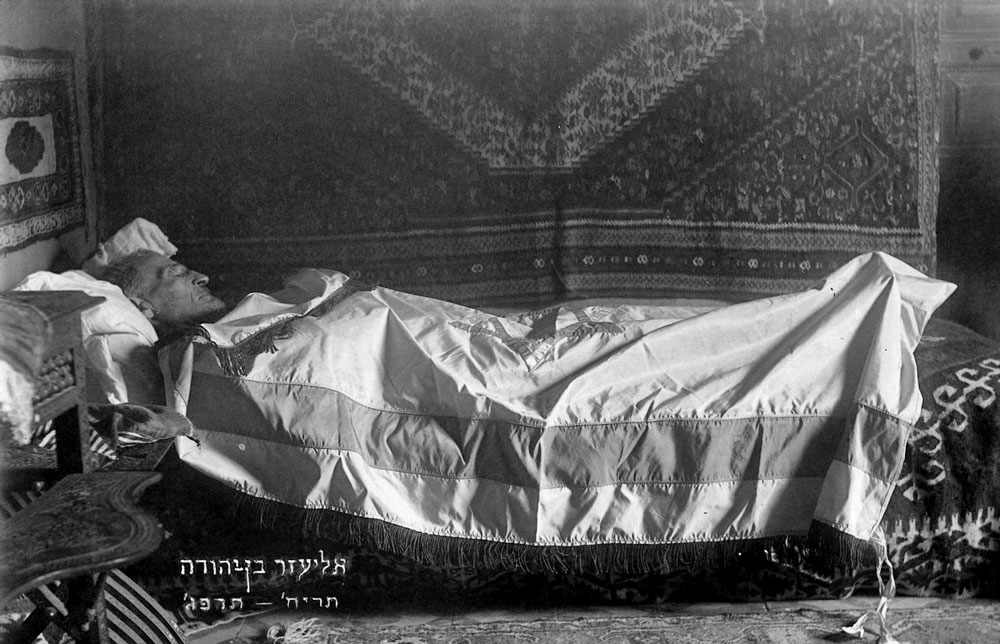
Eliezer Ben Yehuda, 1858-1922. The night of his death, Hemda covered him with a flag containing the Star of David, given to him by the American Jewish community during his four-year “exile” from Jerusalem.
WHAT WAS HIS SECRET?
Eliezer Ben Yehuda lived 41 years with deadly tuberculosis that even killed Devora, his first wife of only 10 years, from that same disease. Three of his children died a couple of months later from a pandemic attack of flu. He lost two more children through disease from his second wife, Hemda. The ultra-Orthodox and the Ottoman Turkish authorities made his life hell. After ten years of blood, sweat and tears in Jerusalem, very few Jews spoke Hebrew as their mother tongue.
He lived through setback after setback trying to create a Hebrew dictionary for his Jewish people. He and his family lived in abject poverty and want, except for the last seven years of his life. All this gives just a glimpse of his struggles and disappointments.
What gave him the ability to survive and succeed facing such crushing misfortunes? What drove this man to such heroic heights?
The vision. It was the vision.
He shared the answer with his family years before:
“I had a vision, and in my vision I was removed from Eastern Europe from the cold misery of the winter and passed onto the passage of the Jordan by Jericho where the children of Israel passed over. I was walking towards the water and a voice sounded in my ears and it said, ‘The redemption of Israel is in its land and its language!’”
Who could have given him this vision but God?
EPILOGUE: ELIEZER BEN YEHUDAA ROADMAP TO THE IMPOSSIBLE

Eliezer Ben Yehuda, Father of the Modern Hebrew Language, believed, when no one else did, that the language of the Bible could be revived to become the language of a new Jewish nation.
With this month of May, Israel’s 70th year of Independence ends. In honor of this prophetic year, I have written about two of the most important people in Israel’s modern history, Theodore Herzl, the Father of Modern Israel, and Eliezer Ben Yehuda, the Father of the Modern Hebrew Language. Most significantly, for the person who is spiritually sensitive, one can see the guiding hand of Providence upon Herzl, and upon Ben Yehuda’s entire family. They all went through unbelievable hardship, but were used by God for His purposes. Therefore, they succeeded in their mission. I wrote two episodes on Herzl and eight episodes (including this Epilogue) on Ben Yehuda. You will find all these episodes in the maozisrael.org archives, beginning with May 2018, or maozisrael.org/herzl-ben-yehuda.
Three years after he moved to Jerusalem, Eliezer Ben Yehuda began work on a “Hebrew dictionary” by listing a few new words in his weekly four-page Hebrew newspaper. The new words came out of necessity when Eliezer and his first wife, Devora, vowed to speak only Hebrew to each other and a few close friends, all of whom barely knew any Hebrew when they immigrated to the region of Palestine in 1881.
Actually, there wasn’t a Hebrew word for “newspaper”—or “printer”—or “post office”—or “stamp”—to mail his newspaper to his few subscribers abroad or in Palestine. There wasn’t a word for “subscriber” or “mail” either.
Yet Ben Yehuda had a mission from which he never wavered—to raise “a spoken Hebrew language” from the dead. To create new words, Eliezer found himself searching the Bible, the Talmud, and all the rabbinical books. But many of the needed words didn’t exist in any of those books, either.
When his first child was born in 1882, Eliezer’s Hebrew world expanded to the need of modern words such as “diaper.” One can imagine why Jews of the late 19th century considered it utterly impossible to resurrect a dead language. It had never happened in the history of mankind. The idea was thought to be pure madness. There was not a single human being on earth who spoke Hebrew as his mother tongue. But Eliezer had a dream and a plan. He would make his firstborn “the grand experiment.”
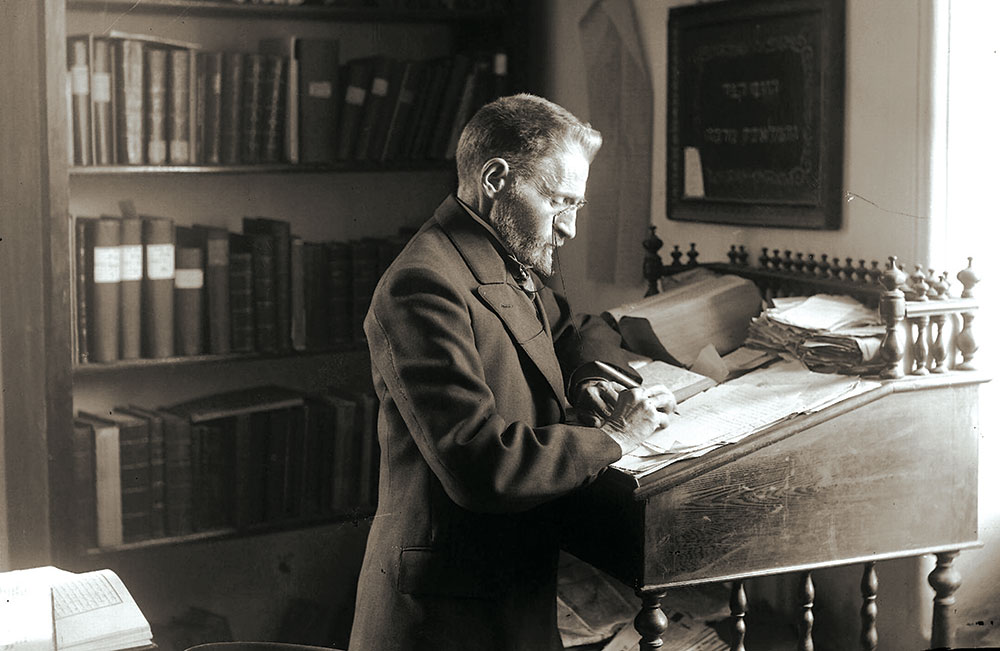
Ben Yehuda, the man who fought tuberculosis in his body for 45 years, preferred to stand while working up to 18 hours a day on his dictionary.
THE GRAND EXPERIMENT
When the news spread that his new son Ben Zion would not be allowed to even hear any other language except Hebrew, the people of Jerusalem actually believed the boy would grow up a disabled “idiot.” Nevertheless, Eliezer and his faithful wife spoke only Hebrew in his presence. This experiment forced them to constantly come up with new words that would meet the needs of families living in the late 19th century lifestyle of the West.
All in all, it is more than doubtful that the Jews returning from the four corners of the world would have agreed on a national language for their newborn state, had the Hebrew language not been prepared for them ahead of time by Ben Yehuda. Indeed, Ben Yehuda and his Hebrew-speaking family became a living legend, an embodiment of a revival that he modeled for others to emulate.
Eliezer realized that if the Hebrew language was to take root among new Jewish immigrants who had begun to settle in and around Jaffa and central Israel, they also needed a vocabulary to express the needs of educated Jews originating from Europe in a world where knowledge was expanding at breakneck speed. Therefore, his best tool at that time was a newspaper.
In 1884, Eliezer founded his own weekly newspaper and started printing a list of a few new Hebrew words in each issue. With Eliezer’s passion and example, little by little, the concept of a modern Hebrew language was beginning to take root among at least a few Jews in Palestine.
But there was another seemingly impossible challenge to overcome. As new immigrants began teaching Hebrew in their schools, the teachers taught according to their taste and accent, even creating their own words. Besides, how do you pronounce a word that didn’t exist until today?
Even before Eliezer moved to Palestine, he was aware there was an Ashkenazi accent spoken by Orthodox Jews from Europe and Russia, and a Sephardic accent of Jews from Arabic nations. (The Yemenite accent was considered the “purest” of all.) Then there were the natural accents of immigrants whose mother tongue was French, German, Yiddish or Arabic.
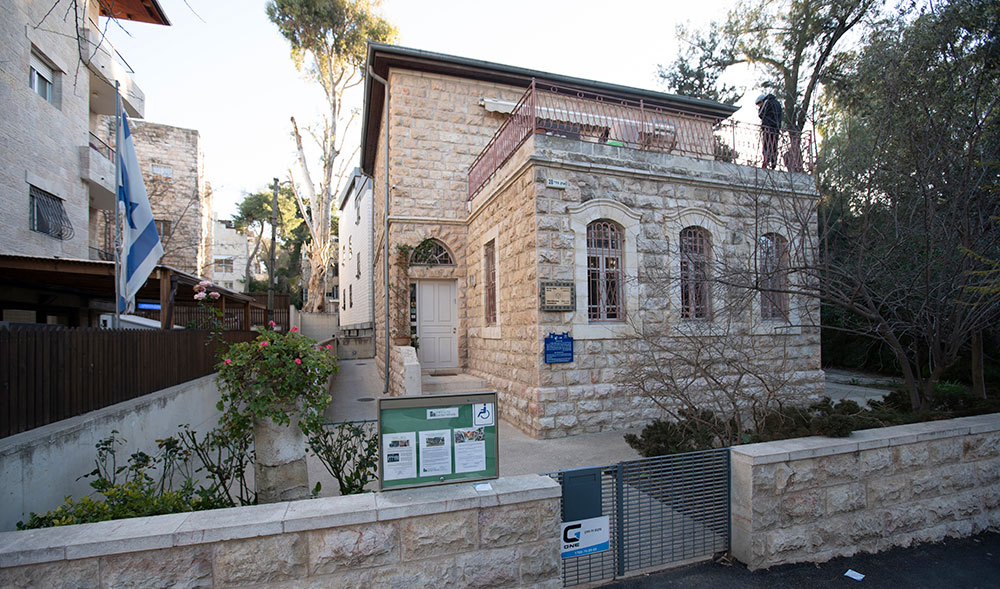
Ben Yehuda Home: He never saw this house, a gift from the American Jewish COmmunity, as it was finished after his death. However, Hemda, his second wife, lived in it for thirty years until her death in 1951. It is now a cultural center and hostel.
A LANGUAGE NEEDS RULES
When Eliezer and Devora spoke with their few friends, they could use the language however they wished. But if Eliezer wanted to circulate a modern tongue with the goal of making it universally spoken among Jews in the Holy Land, the words had to be precise and accurate, according to strict linguistic rules. Therefore, Ben Yehuda became a self-taught scientific lexicographer.
But how was the average reader of his newspaper, who obviously had a very small vocabulary, able to remember all the new words of each week’s newspaper?
And what about the few bold pioneers teaching Hebrew at their makeshift schools in their settlements? They were without a single Hebrew textbook. So, Eliezer began helping them compose such textbooks—not just to learn the language—but to teach math, history and everything else in Hebrew.
Eliezer became increasingly aware of the greatest need of all: “Our crying need is for an up-to-date dictionary. Here we are trying to teach people to speak a language and there is no dictionary of that language!” In fact, there wasn’t even a word for dictionary!
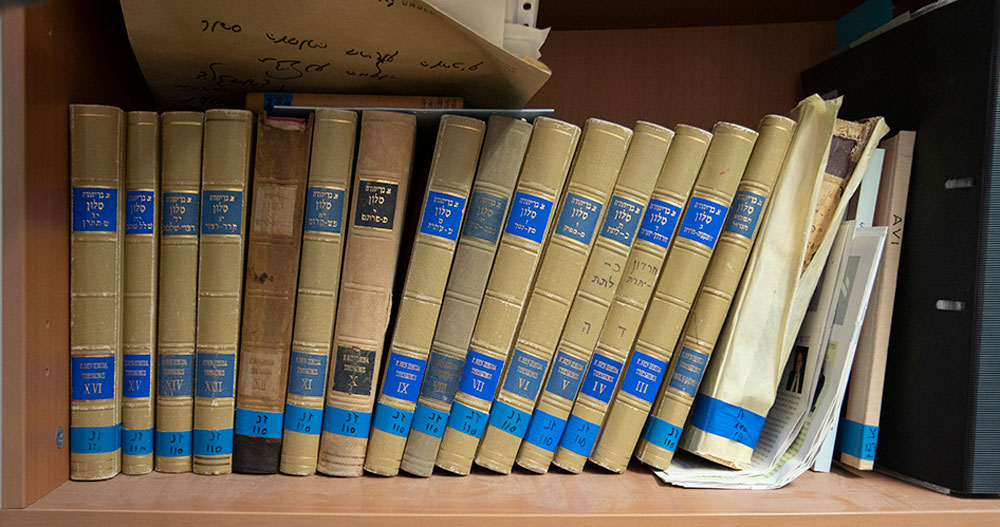
A set of Eliezer Ben Yehuda’s The Complete Dictionary of Ancient and Modern Hebrew stored in the Academy of the Hebrew Language headquarters in Jerusalem. One of the 17 volumes is missing.
DID ANYONE SPEAK HEBREW?
It is true that in some parts of the world there were Jews who had to conduct business with other Jews who had no common language with each other except their Hebrew prayers. They created a kind of pidgin, a semi-language that included words, sounds, body language, simplified syntax, and limited vocabulary. It, of course, was never learned as a first language. But this limited speech encouraged the young Ben Yehuda even before he went to Palestine to believe that Hebrew could again be spoken.
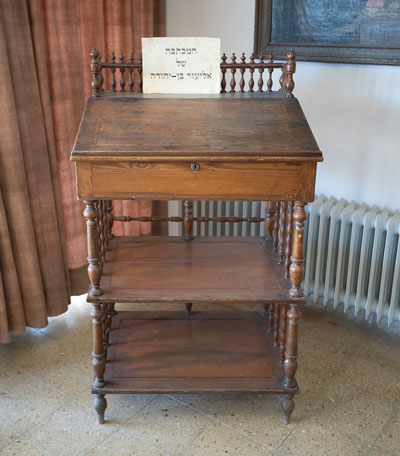
Ben Yehuda’s original desk, made for him to stand while working.
It is estimated that about 50% of male Jews of the 19th century could read the Torah and rabbinical books. But here was the real issue. In Arabic countries, Hebrew literacy was high, as the Jewish communities were more segregated in Islamic cultures. Their religion was the center of their lives. But, in Europe, the Age of Enlightenment had penetrated deeply into Jewish culture. Many Jewish leaders in the West believed Jews should completely assimilate into the local society and culture, giving up their ethnicity and religion. They reasoned that would end all persecution of the Jews forever. In other words, the Jews would cease to exist.
THE LAST OF THE LAST
In the same decade the Russian-born Ben Yehuda immigrated to Jerusalem, the Jewish poet, Yehuda Leib Gordon (1830-1892), wrote: “Perhaps I am the last of Zion’s poets, and you are the last readers.” Gordon himself was a part of the Jewish Enlightenment; he saw little hope for Hebrew becoming a daily spoken language or even a language of literature.
Moshe Lilienblum (1843-1910), who was considered the “dean” of He-brew authors of his time, was also disillusioned with the future of the language. In a newspaper article, he announced, “Hebrew’s time has passed, and it no longer has a purpose or task in Jewish life.”
The Orthodox Jews who knew Hebrew best, and would have been the best candidates to learn spoken Hebrew, would not countenance using it as a modern language. For them it was too holy to use in everyday communication.
But Ben Yehuda recognized a hidden truth in plain sight that no other Zionist leader of his generation saw. Not one! He understood Hebrew and Zionism were one and the same. There would be no Jewish nation without the Hebrew language. There would be no Hebrew language without a Jewish nation. Ben Yehuda wrote, “The Hebrew language can live only if we revive the nation and return it to the fatherland.”
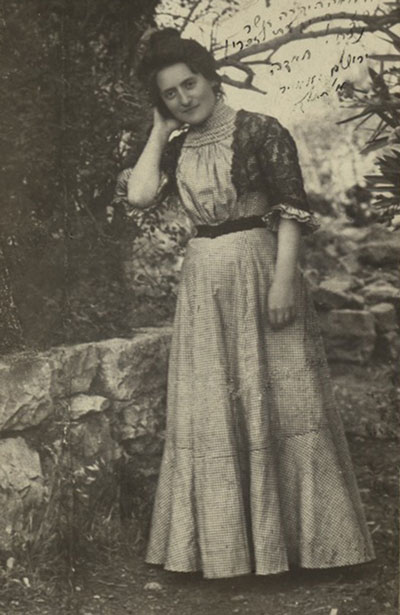
Hemda, second wife of Eliezer Ben Yehuda
Alone and unique from all the visionaries of the Jewish national renaissance, Ben Yehuda saw the whole picture: the need for a people wedded to its land speaking its own language.
Jewish nationalism, to Ben Yehuda, was both the return to the historical homeland and the revival of the Hebrew language. Ben Yehuda thus launched his great undertaking of creating The Complete Dictionary of Ancient and Modern Hebrew.
IRREPLACEABLE HEMDA
One last thought. The dictionary would never have been created had it not been for his second wife, Hemda, who married Eliezer six months after her sister Devora died. She labored with Eliezer every day through their 30 years of marriage. By the time he died, they had completed seven volumes of his dictionary. She had raised the money for all of them.
For the next three decades, 1922 to 1951, Hemda did everything in her power to complete the dictionary, along with her son Ehud. She raised the funds for another six volumes, averaging 600 pages each.
After the state of Israel came into existence, the completion of the dictionary became a state project. The last volume was published in 1958, seven years after her death. There were 17 volumes altogether.
A LEGACY LIKE NO OTHER
Today there is no special memorial for Ben Yehuda, not even a modest museum. However almost every town of any size has a Ben Yehuda street! Even so, the average Israeli knows surprisingly little about the life of Ben Yehuda.
Today Ben Yehuda’s original dictionary is out of print. If you are fortunate, you may be able to find one for sale on eBay. (I just did—although two volumes are missing.) But he has a legacy like no other. Every Israeli who opens his or her mouth to speak their native tongue today is a living memorial to Eliezer Ben Yehuda.
Ben Yehuda, then, was the prophet, the theoretician and tactician, the sign and symbol of the revival of the language. He himself wrote in 1908 in his newspaper, The Deer:
“For everything there is needed only one wise, clever and active man, with the initiative to devote all his energies to it, and the matter will progress, all obstacles in the way notwithstanding… In every new event, every step, even the smallest in the path of progress, it is necessary that there be one pioneer who will lead the way without leaving any possibility of turning back.”
Language and land created a physical foundation for the nation. Yet the greatest “impossibility” is still to come! It will happen when God’s Chosen People return to their God with all their hearts, souls and strength. They will not only be God’s beloved, but He will be their Beloved God. And I am sure they will worship Him and their Messiah in the beautiful Hebrew language!
To this writer, Ben Yehuda’s life is a magnificent example and inspiration to all born-again believers as to how God searches for even one person to stand in the gap to fulfill God’s vision, His desires and His purposes. Even now, God is looking for those to fulfill His plan for our generation.
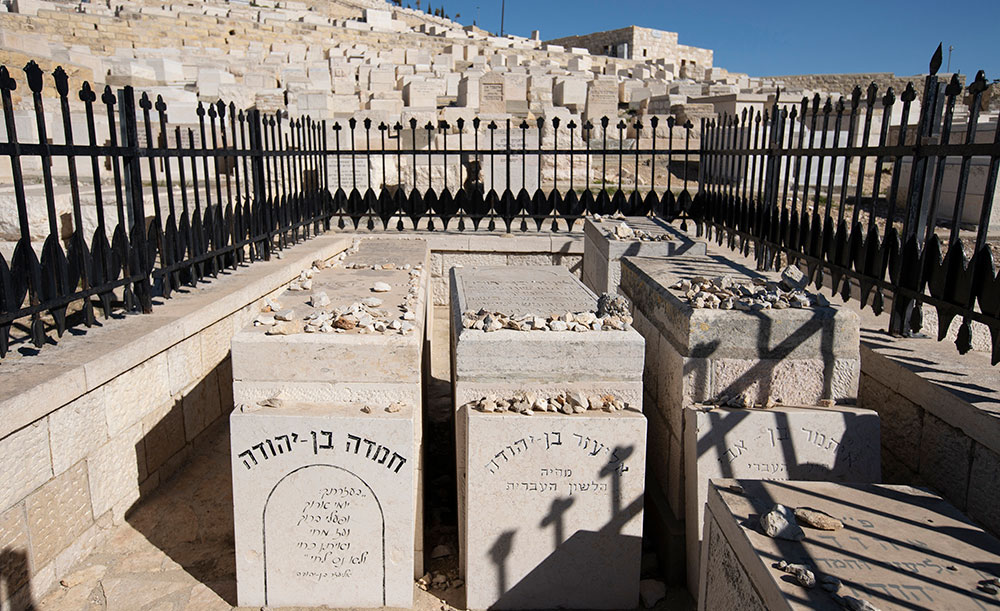
Tombs on the Mount of Olives are inscribed: Eliezer Ben Yehuda (middle right) Reviver of the Hebrew Language. Hemda Ben Yehuda (left) – With your help: my day is long, and my labor is blessed, and my mind is strong, and my strength is steady, and my natural vigor is not diminished (last line from Deuteronomy 34:70). [Taken from a tribute of Eliezer to his wife]
